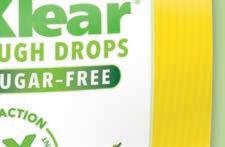




EXEMPLARY AT ESG
Read
PG reveals this year’s Category Captains
PRIME TIME FOR PROTEIN Shortcuts, value and variety maintain consumer interest

RETAILER OF THE YEAR















EXEMPLARY AT ESG
Read
PG reveals this year’s Category Captains
PRIME TIME FOR PROTEIN Shortcuts, value and variety maintain consumer interest

RETAILER OF THE YEAR









This year’s Impact Awards shine the spotlight on a range of grocery industry retailers, suppliers and solution providers that are doing good in various ways.

PG’s current Category Captains show themselves to be masters of sales growth across the store. 53 PHOTO ALBUM Grocery Impact and Top Women in Grocery
Discover or relive memorable moments from PG’s fl agship event and its culminating awards gala.








Shortcuts, value and variety remain expected ways to drive protein shopper behaviors into a new year.









Retailers can catch their share of protein sales by providing cook-at-home consumers with more options, ideas and information. 64
The 2024 Top Women In Store Brands honorees each offer unique skill sets that are helping drive business.
76 SPECIAL REPORT: PG’S RETAIL INNOVATION OUTLOOK Technology Takes the Lead
Grocers and solution providers put the focus on customer experience, associate success, and more.
82 EQUIPMENT & DESIGN The Future of Fixtures
Key company executives and board members discuss the company’s current impact on the grocery business, as well as growth opportunities in the years ahead.

Flexibility is the name of the game for retailers keen to address shifting consumer preferences, seasonal trends and inventory changes.



By Gina Acosta
THE HOLIDAYS ARE A GOOD TIME TO SHOW GRATITUDE.

Gina Acosta Editorial Director & Associate Publisher gacosta@ensembleiq.com
ere at Progressive Grocer, we have a lot to be thankful for in 2024.
Our annual GroceryTech and Grocery Impact events were big successes, attracting record numbers of attendees, from retailers large and small to so many new and returning sponsors — whom we thank for their support.
Our 24/7/365 original reporting continues to resonate with so many of the wonderful people in the grocery industry and beyond.
But sometimes we forget to show gratitude for one another, and this year I want to extend some special thanks to all of the people who work so hard to drive excellence at PG every day:
Managing Editor Bridget Goldschmidt is the queen of PG, and we could not thrive without her.
Senior Editor Lynn Petrak is our roving reporter driving thousands of miles across the country just to cover a store opening or product innovation at a trade show.
Digital Editor Marian Zboraj is marking milestone after milestone on social media and our website, elevating our presence every day across the world.
Multimedia Editor Emily Crowe is creating exclusive and engaging content that leads in the B2B media space.
Art Director Bill Antkowiak is a true artiste — a master of design — and we couldn’t get anything done without him.
Senior Sales Managers Tammy Rokowski and Theresa Kossack bring brilliant and inspiring ideas to the organization every day.
Our production, marketing, events and digital operations experts Jackie Batson, Teresa Dombach, Alexandra Voulu, Nicola Tidbury, Marci Saling, Emily Dubovec and Valetta Dsouza (and many others) help bring our content to beautiful life digitally and in person.
Group Brand Director Eric Savitch is our fearless leader as we go into another year of exploring new opportunities.
EnsembleIQ CEO Jennifer Litterick serves as a role model for me and so many of us at this company, with her passion for the industry and dedication to innovation.
And last, but certainly not least, there is you, our faithful audience. Turning to us when you have other choices. Reading our breaking-news texts or listening to our podcasts or attending our events across the country. We are so thankful for you. And we cannot wait to create more content and special events for you in the new year.
See you in 2025!
8550 W. Bryn Mawr Ave. Ste. 225, Chicago, IL 60631
Phone: 773-992-4450 Fax: 773-992-4455
www.ensembleiq.com
BRAND MANAGEMENT
VICE PRESIDENT & GROUP BRAND DIRECTOR Eric Savitch esavitch@ensembleiq.com
EDITORIAL
EDITORIAL DIRECTOR & ASSOCIATE PUBLISHER Gina Acosta gacosta@ensembleiq.com
MANAGING EDITOR Bridget Goldschmidt bgoldschmidt@ensembleiq.com
SENIOR DIGITAL & TECHNOLOGY EDITOR Marian Zboraj mzboraj@ensembleiq.com
SENIOR EDITOR Lynn Petrak lpetrak@ensembleiq.com
MULTIMEDIA EDITOR Emily Crowe ecrowe@ensembleiq.com
CONTRIBUTING EDITORS Mike Duff and Debby Garbato
ADVERTISING SALES & BUSINESS
ASSOCIATE PUBLISHER, REGIONAL SALES MANAGER Tammy Rokowski (INTERNATIONAL, SOUTHWEST, MI) 248-514-9500 trokowski@ensembleiq.com
REGIONAL SALES MANGER Theresa Kossack (MIDWEST, GA, FL) 214-226-6468 tkossack@ensembleiq.com
REGIONAL SALES MANGER Natalie Filtser (CT, DE, MA, ME, RI, SC, TN, NH, VT, MD, VA, KY) 917-690-3245 nfi ltser@ensembleiq.com
PROJECT MANAGEMENT/PRODUCTION/ART
ART DIRECTOR Bill Antkowiak bantkowiak@ensembleiq.com
ADVERTISING/PRODUCTION MANAGER Jackie Batson 224-632-8183 jbatson@ensembleiq.com
SENIOR DIRECTOR OF MARKETING Nicola Tidbury ntidbury@ensembleiq.com
SUBSCRIPTION SERVICES LIST RENTAL mbriganti@anteriad.com SUBSCRIPTION QUESTIONS contact@progressivegrocer.com
CORPORATE OFFICERS
CHIEF EXECUTIVE OFFICER Jennifer Litterick
CHIEF FINANCIAL OFFICER Jane Volland
CHIEF OPERATING OFFICER Derek Estey
CHIEF PEOPLE OFFICER Ann Jadown
PROGRESSIVE GROCER (ISSN 0033-0787, USPS 920-600) is published monthly, except for July/August and November/December, which are double issues, by EnsembleIQ, 8550 W. Bryn Mawr Ave. Ste. 225, Chicago, IL 60631. Single copy price $17, except selected special issues. Foreign single copy price $20.40, except selected special issues. Subscription: $150 a year; $276 for a two year supscription; Canada/Mexico $204 for a one year supscription; $390 for a two year supscription (Canada Post Publications Mail Agreement No. 40031729. Foreign $204 a one year supscrption; $390 for a two year supscription (call for air mail rates). Digital Subscription: $87 one year supscription; $161 two year supscription. Periodicals postage paid at Chicago, IL 60631 and additional mailing offices. Printed in USA. POSTMASTER: Send all address changes to brand, 8550 W. Bryn Mawr Ave. Ste. 225, Chicago, IL 60631. Copyright ©2024 EnsembleIQ All rights reserved, including the rights to reproduce in whole or in part. All letters to the editors of this magazine will be treated as having been submitted for publication. The magazine reserves the right to edit and abridge them. The publication is available in microform from University Microfilms International, 300 North Zeeb Road, Ann Arbor, MI 48106. The contents of this publication may not be reproduced in whole or in part without the consent of the publisher. The publisher is not responsible for product claims and representations.


Our Jasmine Rice is 100% Thai Hom Mali rice imported directly from Thailand to guarantee the best quality and flavor possible. Stock your shelves with GOYA® Jasmine Rice, a top-selling brand in the U.S.,* and offer your shoppers the perfect ingredient to elevate their recipes.
5
National Keto Day. Spotlight products suitable for people following this popular eating regimen.

12
National Pharmacist Day. Suggest that shoppers visit the store pharmacy to say hello to the friendly staffers who work there, and to get any questions answered.
19 Tin Can Day. Make shoppers aware that canned foods can be part of a healthy –and tasty – diet.

26
On Australia Day, let’s pay tribute to our friends down under with some of their favorite things to eat, like Vegemite on toast or a pavlova for dessert.
6
National Take Down the Christmas Tree Day
Three Kings Day
7
Dry January
National CBD Month
National Sunday Supper Month
National Staying Healthy Month
1
New Year’s Day is also Apple Gifting Day, sopolish up that McIntosh to present to a loved one.

8
2
Swiss Cheese Day. Encourage customers to share a “hole” lot of recipes using this favorite variety.

9
3
National Wheat Bread Month
Prune Breakfast Month
Veganuary

In honor of musician Kenny Loggins’ birthday, crank up your yacht rock playlist to serenade customers as they shop.

13
National GlutenFree Day. Make sure that your shelf tags throughout the store call out all products with this particular attribute.
20

Martin Luther King Jr. Day

14 Poetry at Work Day. Perhaps there’s a budding bard among your associates? Hold a fun supermarketthemed poetry contest to find out.

21
National Grandma Day. You know what Nana would like to do? Go shopping at her preferred grocery store.
National JoyGerm Day. Use this occasion to spread happiness among your associates and shoppers.

15
National Pothole Day. Keep your parking lot(s) free of these driving and pedestrian hazards.
Healthy Weight, Healthy Look Day. Have your retail dietitian share tips with customers to help them shed pounds.

16

22
National Grandpa Day. Gramps isn’t much for shopping, but he’d appreciate a case of his favorite beer from the market.

National Boston Day. Celebrate the many culinary delights that come from the city, including the baked legumes that gave it the nickname Beantown.
23
National Rhubarb Pie Day. Here’s that opportunity to promote greater consumption of this vegetable that’s used like a fruit.

28

Data Privacy Day. Employ the most advanced solutions to ensure that your customers’ sensitive info isn’t leaked.
Tubers and Dried Fruit Month
International Mind-Body Wellness Day. Direct shoppers to treatments featuring ingredients found within your aisles.
10
National Bittersweet Chocolate Day. This baking essential adds deliciousness to a wide range of treats.
4
National Spaghetti Day. From Lady and the Tramp on down, everybody loves this pasta.

11
National Arkansas Day. Champion those unique foods and beverages hailing from the Natural State.

17 On Popeye Day, remind health-minded shoppers that they’ll be strong to the “finich” if they eat their spinach.

18
24
International Day of Education.
National Preschool Health and Fitness Day. Have your healthy-living team recommend nutritious snacks and invigorating activities to keep tots in peak condition. IN-STORE

Enable your associates to learn more so they can further their careers at your company.
National Gourmet Coffee Day. Highlight the premium brands in this segment, as well as café-quality beverages that customers can prepare at home.
25

National Fish Taco Day. Offer yummy alternatives to beef and chicken for family Mexican meal nights that don’t have to be on Tuesdays.
27 For Better Business Communication Day, commit to working harder at making yourself better understood when interacting with colleagues.

29
Chinese New Year. Happy Year of the Snake!
30

National Draw a Dinosaur Day. See what your younger shoppers can come up when asked to imagine these giants in the store – a T. rex trying (and failing) to steer a shopping cart?
31










Berry Fresh Month
Exotic Vegetables and Star Fruit Month
National Avocado and Banana Month
National Bake for Family Fun Month
National Fondue Month
National Grapefruit Month
National Macadamia Nut Month
National Snack Food Month
2
Groundhog Day. It’s also Hedgehog Day and Marmot Day, but Punxsutawney Phil and his shadow get all of the attention.
3 For Doggy Date Night, suggest that pet parents stock up on treats and toys to pamper their preferred pooches.

9
With the Big Game taking place today, promote National Homegating Day.

4
National Stuffed Mushroom Day. There are myriad recipes for this tasty appetizer that you can share with your shoppers.

5
On Disaster Day, make sure that your plans in case of a catastrophe are up to date.

6
National Valentine Shopping Reminder Day. Come on, there’s just over a week left to buy something special for your significant other!
7
National Send a Card to a Friend Say. Your greeting card selection can provide many creative choices.
1
Decorating With Candy Day. Offer consumers some fun edible projects for the whole family.
16

For Innovation Day, ask associates what they would do to make business better, and then act on the best suggestions.
10 Sick of Food Waste Day. As well as publicizing your own efforts to manage this concerning issue, provide tips enabling shoppers to do their bit.
11
For Get Out Your Guitar Day, request that a musically talented associate serenade customers in the aisles.

17
Presidents Day. Time for some starspangled savings to celebrate our 47 commanders-in-chief (so far).
18
12
National Lost Penny Day. You know what they say: It’s good luck if you pick one up.

19
13

National Tortellini Day. However it’s prepared, this succulent stuffed pasta slaps.

20

14
Valentine’s Day need not only be about romantic couples, but also the many types of love between people.
8
National Iowa Day. Shine the spotlight on the distinctive foods and beverages of the Hawkeye State.
15
National I Want Butterscotch Day. Then you shall have it – look no further than the candy aisle.

21
22


National CrabStuffed Flounder Day. Direct shoppers to the seafood section to get the main ingredients for this elegant but easyto-make dish.
National Vet Girls ROCK Day. Pay tribute to all of your female staffers who served in the armed forces.

National Leadership Day. Identify those among your associates with the potential to advance, and arrange mentorships to help them move up.
National Caregivers Day. Make sure people fulfilling this important duty have all that they need when they visit your store(s).
It’s Open That Bottle Night, so have a fine selection of wines and spirits available (laws permitting), along with helpful pairing recommendations.
23
Curling Is Cool Day. Let’s keep raising this winter sport’s profile in the United States through themed promotions with local clubs.
24 On World Bartender Day, hold a video demonstration showing shoppers how to be their own mixologists.

25
Let’s All Eat Right Day. Your retail dietitian can help customers remake their diets.

26
Letter to an Elder Day. This is a good opportunity for young shoppers and teenage associates to write notes of appreciation for seniors in the local community, with screenshots posted online.
27
National Protein Day. Animal or plantbased – it’s time to highlight the benefits of this essential nutrient.

28
National Vegan Lipstick Day. If you carry it in your cosmetics section, let your cruelty-free customers know.



The Inspired Home Show ® is the industry epicenter for everything new and next in home + housewares, bringing both enduring and emerging trends to the table. Since 1939, the Show has been a reliable conduit for innovation and incubator for brands to introduce the next must-have products your customers are looking for.
Don’t miss this milestone event where the industry connects around innovation, insight and inspiration.
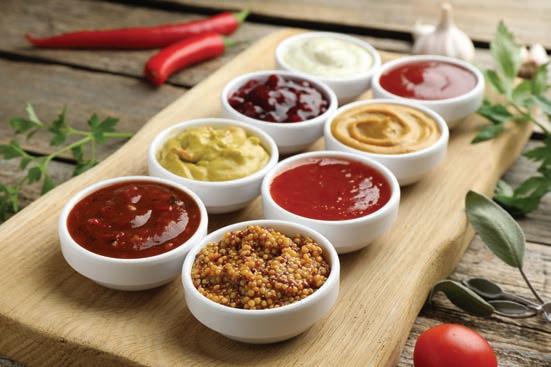

$3.73 for all condiments, up 1.1% compared with a year ago

$5.27 for mayonnaise, up 2.7% compared with a year ago

$3.54 for ketchup, up 0.6% compared with a year ago

$3.22 for hot sauce/chili, down 0.5% compared with a year ago
What is the value per occasion for condiments versus the year-ago period? $4.98
$5.78 for
Source: NIQ, Total U.S. (all outlets combined) during the 52 weeks ending Sept. 28, 2024
$2.37

$2.24 for mustard, down 0.8% compared with a year ago

$5.30 for sandwich dressing, up 0.2% compared with a year ago
Source: NIQ, Total U.S. (all outlets combined) during the 52 weeks ending Oct. 5, 2024
Yogurt has maintained its place in consumer households and its perceived health benefi ts, affordability and familiarity. This has positioned it positively during a time when people are watching their grocery spending. Increased snacking frequency and growing consumer interest in health have primed yogurt for future success.
Fun, innovative flavors and improved product attributes aren’t enough to increase usage for most. Opportunity lies in revolving innovation around what consumers most expect to receive when purchasing this category. Ensuring that innovation truly meets the needs of consumers is a must.
Changing lifestyles and eating behaviors won’t push consumers out of the category; rather, they will open doors for new opportunities to expand usage. Yogurt drinks, tubes and pouches are prime for takeoff, as they give consumers all of the desired health benefits, with greater convenience.


The basics continue to reign in yogurt, especially when grocery budgets are tight. Fruit-forward, spoonable styles are maintaining their position as top players, and consumers are happy with current offerings. People largely turn to yogurt as a simple protein booster and gut supporter; thus, health benefi ts and convenience are expected.
Younger generations are changing their eating behaviors and swapping meals for snacks to fuel their day. With naturally high protein and easy consumption, yogurt is prime for on-the-go occasions. Emphasizing nutrition benefits and portability has the potential to ensure that yogurt and yogurt drinks have a place in changing diets and lifestyles.
Yogurt is a staple; health, convenience and value form the trifecta of purchase drivers. Even with rising costs, yogurt’s trusted health image and familiarity keep consumers coming back to the category. Emphasizing clear benefi ts in regard to these purchase drivers ensure that consumers’ expectations are met in this category.
Innovation plays a role in maintaining consumer engage–ment, yet too many new products cause decision fatigue and brand cannibalization. Revolving innovation around yogurt’s key purchase drivers — health and convenience — can ensure that new product launches are truly relevant on the shelf and provide value to consumers.
With snacking poised to replace traditional mealtimes, brands have a chance to become necessities in snack repertoires. Emphasizing ease and portability of yogurt drinks, along with highlighting the value of tubes and pouches to adolescents and adults as well as children, can position yogurt as a valuable product for on-the-go sustenance.
Brands can lean into yogurt’s perceived nutrition, affordability and convenience to show value during inflationary times. Highlighting yogurt-forward recipes for both sweet and savory dishes and beyond to such applications as beauty — e.g., homemade face masks — can inspire yogurt usage in new occasions and simultaneously alleviate concerns over food waste.
By Molly Hembree, MS, RD, LD


ealthy eating habits established early in life are a strong predictor of long-term food choices made into adulthood. Eating styles and patterns followed at a young age set the foundation for a life’s worth of food consumption. It’s important to create a fun, safe and encouraging environment around food for kids, as this can lead to improved health outcomes and a positive relationship with food. The grocery store is where it all starts, where choices are made at the shelf edge, and these foods are provided to children whose growth and development rely on sound nutrition.


Toddlers and school-age children are sorting through many new thoughts and feelings, some of which include how and what to eat. Younger children are often curious and inquisitive about tastes, textures and smells associated with food, while older eaters may be finding their favorite flavors and go-to meals and snacks. Now is the time to regularly introduce a variety of foods to help expand children’s acceptance and enjoyment of different products. Some parents craft weekly grocery lists alongside their children so little ones can have a greater influence on what foods are available in the home.
Encourage shoppers to make mealtime more of an adventure for their families with recipe cards in the physical or digital aisle, a greater number of coupons dedicated to kid-friendly fare, and expanded options in your kitchen equipment department, such as kid-sized aprons or small silicone spatulas for holiday baking.
There’s a sense of pride when we contribute to the success of something, even a tasty family breakfast on Sunday morning. The creativity involved in putting together food is a spectacle for kids and heightens their appreciation of nutrition. Any effort to get kids in the kitchen to construct their own meal, snack or beverage, puts them in charge of what they eat or drink and helps build important life skills in meal preparation.
Your retailer can support these interests by offering dietitian-led personal shopping tours with kids and their parents or chef cook-alongs for children, or by setting up tables with kid-friendly activities such as fruit and vegetable scavenger hunts and stickers.
Perspective is everything. When it comes to children in particular, the attitude conveyed toward certain foods will be noticed. Avoid assigning a “good” or “bad” distinction to foods. This can make children think that they should fall
Eating styles and patterns followed at a young age set the foundation for a life’s worth of food consumption.
in love with a certain food if it’s considered “good” or turn up their nose when presented with a “bad” food. Show kids just as much enthusiasm for a fresh, juicy pear as a gummy bear, or for a crisp whole grain cracker as a gingerbread cookie, and you may persuade youngsters to give equal attention and attempts to either food.
Work with your category strategists, packaging specialists or private label managers to fi nd better ways to position healthy packaged foods toward children. This may also be a good time to expand your in-store sampling program to include exotic fruits or a better-for-you station with kid-centric foods.
The first years of a child’s life can determine years of habits, including eating habits. Your retailer can be a champion for good food that nourishes people at a pivotal time in their early lives.
Molly Hembree, MS, RD, LD, is a registered dietitian for Kroger Health.
By Gina Acosta
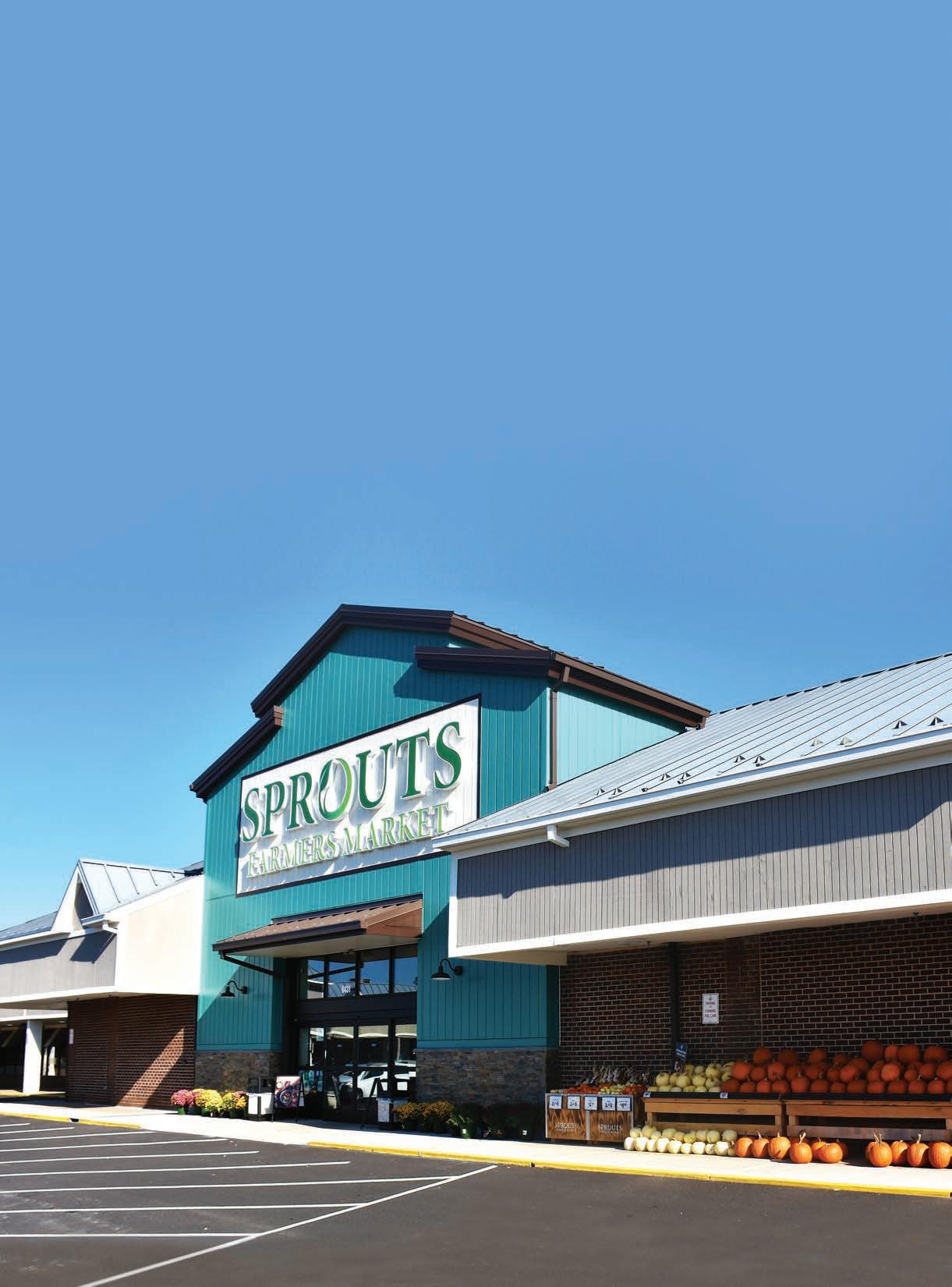
Last year, Sprouts Farmers Market CEO Jack Sinclair walked onto a stage at the National Retail Federation’s Big Show in New York City and gave everyone in the audience the recipe for the retailer’s secret sauce:
“It’s very important for us to have the curation and differentiation that allows us to have that appeal to a customer that you can’t buy elsewhere. A lot of the investment from the digital world that’s moving into the physical world is based on having an assortment that everyone can access. Our aspiration is to be a great, curated organization so that people can only get what they want at Sprouts.”
That recipe for success has proved to be a big hit with shoppers.
Fast-forward to 2024, and Sprouts Farmers Market can’t seem to open stores fast enough as the retailer attracts scores of young families and consumers hungry for a simplified yet curated shopping experience that offers the right products at the right

“Sprouts Farmers Market is honored to receive Progres sive Grocer’s Retailer of the Year award, a reflection of the dedicated people, culture and values that define our organization,” says Sinclair. “This achievement would not be possible without the commitment of our more than 33,000 team members across the country, who work tirelessly to care for our customers and deliver an exceptional shopping experience every day. As we expand to new markets across the country, we will stay true to our roots of fresh produce and healthier products that inspire our customers to live and eat better and enrich the communities we serve.”
Borrowing from its farmstand heritage, Sprouts aims to offer a unique grocery experience featuring an open layout with fresh produce at the heart of the store. Sprouts wants to attract the wellness shopper with a carefully curated assortment of betterfor-you products. The healthy grocer is focused on sourcing the latest in wholesome, innovative products made with lifestyle-friendly ingredients offering such attributes as organic, plant-based and gluten-free. However, Sprouts is managing to attract not just the health-minded shopper, but also the traditional grocery customer.
Based in Phoenix, Sprouts today is one of the largest and fastest-growing retailers of food in the
Sprouts CEO Jack Sinclair says that the retailer has taken advantage of the consumer’s pivot back toward food at home by increasing meal solutions across the fresh and frozen departments.
United States, with annual sales of $6.8 billion in 2023. It employs approximately 33,000 team members and operates more than 430 stores in 24 states nationwide, with a long runway of growth ahead.
In 2023, Sprouts, which previously had been operating formats spanning around 30,000 square feet, opened 30 stores debuting a new smaller format of around 23,000 square feet, featuring innovation tables, self-checkouts, and reimagined deli, frozen and meat departments. These features are designed to make it easier for customers to find new and unique products, according to the company. So far in 2024, Sprouts has opened 35 stores as it continues to expand into new and existing markets, from California to Florida and the Mid-Atlantic. Since the pandemic began in 2020, the company has opened more than 106 new stores.
In its latest earnings report, published in late September, the retailer surpassed expectations. Sales at Sprouts during its third quarter increased by 14% compared with the third quarter of 2023, including an 8.4% increase in same-store sales, while diluted earnings per share grew by 40% from last year.





Today’s consumers are looking for high-quality, unique items to add to their shopping carts — and products from Ireland are one option grocery retailers can turn to deliver what those consumers seek.
What is it about Irish food and drink items that is so appealing to shoppers? And why should grocers make sure those products are in their inventory? Mossie Power, Vice President of Grocery for Bord Bia North America, the organization that connects U.S. buyers and distributors with Irish food and drink brands, answers those questions and more for Progressive Grocer readers.
Progressive Grocer: Grocers might not think of Irish products right away when they’re considering new items to bring in-store. Why should they be on the list of items to introduce?
Mossie Power: Exports of Irish food and drink to the U.S. have increased by 25% over the past 5 years, a strong performance by any measure. In a crowded, competitive landscape, Irish products increasingly stand out. Branded offerings in key categories have drawn consumer attention to our industry’s core strengths: food and drink sustainably produced by farmers and manufacturers who care for the quality and authenticity of their products. It is an opportunity that extends across the retail sector and speaks to increasing consumer demand for premium and distinctive brands.
There is a growing demand for quality products amongst consumers who are ever more informed on the origin of their food and drink. Consumers are prioritizing taste, along with health, and now are increasingly aware of the sustainability credentials of the products they choose. Ireland’s pioneering and unique sustainability program for its food and drink industry, Origin Green, covers over 90% of food and drink exports. This means when sourcing from Ireland, retailers can be confident they are choosing products that meet clear and independently audited sustainability and environmental criteria.
PG: Bord Bia has launched a U.S.-focused Supplier Development Program. What would you like grocers to know about that program?
MP: Through our U.S.-focused Supplier Development Program, we ensure Irish food and drink companies ambitious to succeed in the U.S. are primed with the insights and expertise needed to hit the ground running. Working with leading industry experts and market mentors, companies participating in our program have their positioning, marketing and supply strategies thoroughly interrogated and tested to ensure their market readiness and route to market strategy is fully developed.
Ireland’s food and drink industry is globally focused exporting 90% of what we produce, meaning a secure source of supply for retailers. The objective of the program is to bring a cohort of high potential and innovative Irish food suppliers through a rigorous capability framework leading to a successful launch with their retail partner. Essentially this eliminates as much of the risk in launching a new Irish brand while also ensuring any committed supply relationship is developed beyond the initial trial stage on shelf. This program is tailored to meet the specific needs of each retailer we collaborate with, ensuring that buyers can confidently engage with new Irish brands poised for suc-
cess. The support these brands receive from Bord Bia complements the efforts of their broker and distributor partners, as well as the retailers themselves.
PG: What are some of the food and beverage categories that are especially popular with U.S. consumers?
MP: Today, the U.S. is one of Ireland’s largest food export markets. It’s a success story built on long-standing fundamentals — from grass-based farming systems to stringent food safety standards and to our commitments to producing to the highest international quality criteria. Ireland is best known for its quality dairy products though this extends across the store to Irish beef, as well products such as potato chips to nutritional bars to mention only a few.



To learn more about how Bord Bia can help your store meet the growing opportunity for Irish food and drink in the U.S., please contact Mossie Power Maurice.power@bordbia.ie.

“We are driving robust traffic growth and continue to execute at a very high level,” Sinclair said when the report came out. “We remain confident in our long-term growth potential.”
Also in the third quarter, total sales were $1.9 billion, up $232 million from the same period last year.
“Our comp was split fairly evenly between traffic and basket, and we saw a strong traffic comp both in store and online,” said CFO Curtis Valentine during the company’s earning call. Sprouts began offering grocery e-commerce services in 2015 and now provides delivery and pickup at all locations through its website, powered by Instacart, Uber Eats and DoorDash. Sprouts’ e-commerce sales have grown 36%, representing 14.5% of total sales. The retailer’s online assortment serves as an extension of its in-store offerings, providing customers convenient access to a variety of healthy choices, whether fresh or dry grocery.
“The consumer’s pivot toward food at home and a growing focus on healthy living are bringing additional customers to Sprouts,” Valentine added during the earnings call.
According to a recent report from Santa Cruz, Calif.-based research firm Placer.ai, Sprouts’ foot traffic during its third quarter increased by 8.1% year over year, and the average number of visits to each location was up 2.6%. Additionally, during September, visits were up 8.1% year over year, and they were also up 8.5% in August and 7.9% in July.
Sprouts opened nine new stores during Q3. The company has nearly 110 approved new stores and more than 70 executed leases in the pipeline for the years ahead.
“We are more committed than ever to making healthier options available to our customers in as many communities as possible,” Sinclair said this past September.
The retailer expects total sales growth to be approximately 12% for the full year and comp sales to be approximately 7% in fiscal 2024. For the full year, Sprouts anticipates capital expenditures to be between $205 million and $215 million. The
Sprouts is always looking to expand its range of organic produce, which is experiencing faster growth than conventional produce. Organic produce now comprises more than 46% of total produce sales at Sprouts.
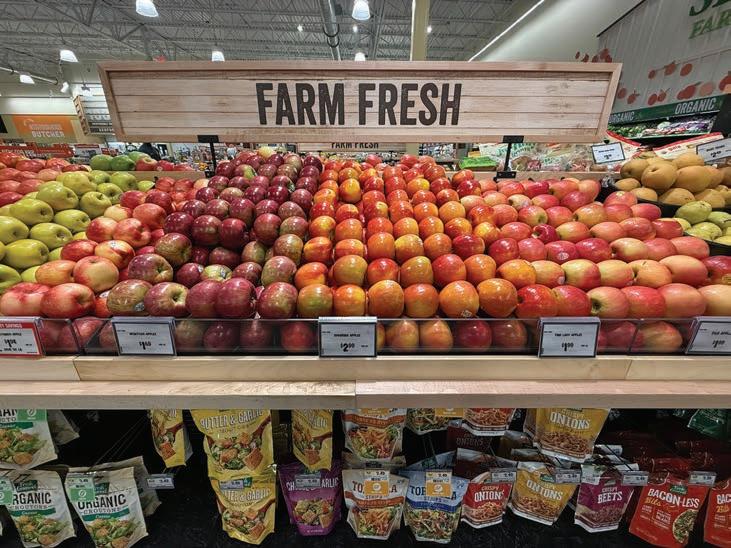














company plans to open 33 new stores instead of the previous guidance of 35, after deciding to delay two store openings in Florida, due to the impact of Hurricane Milton, until the first quarter of 2025.
“We acknowledge that we have some macro tailwinds at our back, but we are putting in the effort to establish a strong foundation that will enable the business to thrive in every environment,” explained Sinclair. “Our third-quarter results and overall momentum continue to confirm our belief in our target customer-focused strategy. … Our results enable us to keep investing in our growth. We’re enthusiastic about the opportunities ahead, and our teams are rising to the challenge.”
Sprouts’ robust financial performance in 2024 — with strength in same-store sales, traffic, e-commerce and merchandising innovation — showcases its momentum and potential in the grocery sector in the years ahead.
According to Sprouts, it works to make sure that the shopping experience remains elevated in a world of new operational challenges by focus-

“As we expand to new markets across the country, we will stay true to our roots of fresh produce and healthier products that inspire our customers to live and eat better and enrich the communities we serve.”
—Jack Sinclair, Sprouts Farmers Market CEO
ing on the needs of its core customer: Sprouts shoppers are really into their food. In fact, the Sprouts website urges them: “Find your healthy.”
Sprouts’ core customer is looking to make healthy choices (for example, produce represents 20% of sales at the company) and experience new things that align with their unique diets (more than 70% of Sprouts products are attribute-driven). They’re also highly engaged and connected to their food and how they shop for it.
The company remains committed to a smaller format built to provide shoppers with a simple, intuitive store that delivers a true treasure-hunt shopping experience, full of fresh, unique and local products.
In-store, Sprouts offers a bright and airy farmers market experience with an open layout, community feel, personal connections, treasure-hunt shopping, and produce always at the




heart of the market. Signage next to local and unique products promotes value through storytelling.
As an example of its better-for-you focus, the company has refined its plant-powered proteins offering as a destination, and a “New For You” innovation center showcases the latest products exclusive to Sprouts. In fact, the retailer puts niche brands first and has grown many mom-and-pop companies into national brands. The innovation center is updated frequently to deliver the newest and most original products to surprise and delight shoppers.
“Our ongoing innovation efforts continue to be a differentiator for us,” asserts Sinclair. “This year, over 170 new items have transitioned from our innovation center to our inline shelves. As Sprouts is becoming a vendor of choice for new trend-forward brands, our foraging team also continues to explore new tastes and trends from across the globe, [going] from trade shows to restaurants for inspiration.”
This innovation extends to the frozen department, where Sprouts has added more than 115 new items that are leaders in natural and organic innovation. The retailer has also vastly expanded its grab-and-go options and prepared foods such as fresh-baked bread, meal-prep items, soups, salads, sandwiches and other fresh products.
“We’ve taken advantage of the consumer’s pivot back towards food at home by increasing our meal solutions across our fresh and frozen departments, with items like our grass-fed beef, stuffed peppers, black garlic marinated NAE [no antibiotics ever] chicken skewers and our organic grass-fed meatballs,” says Sinclair. “These unique natural products you can only find at Sprouts, and they lead our category growth.”
Sprouts offers approximately 200 SKUs of nuts, seeds, candies and grains, which are resonating well with shoppers who care about value and reduced packaging.
The retailer is currently testing a loyalty program in two markets, with plans to extend to more markets in early 2025.
“Our new loyalty program will be our data acquisition engine
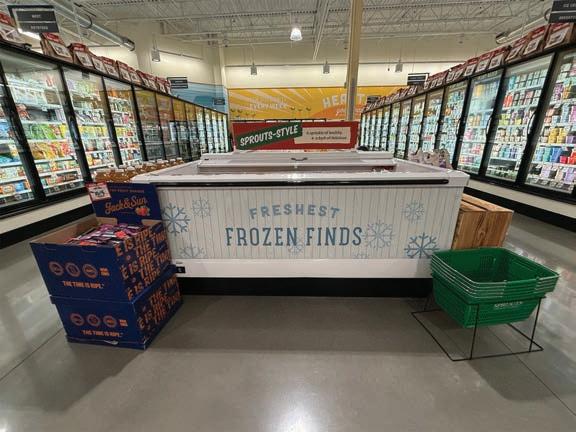














?
We pride ourselves on creating irresistible products that consumers love. As a family-owned company, we’re focused on launching products we know will delight our consumers, even if those products take years to perfect. Pretzel Bites have been years in the making; we’ve tweaked the recipe over and over to get it just right. Before launching nationally, we ensured that approximately 90% of consumers agreed the product tastes ‘GREAT.’ The innovation journey allowed us to make sure we delivered an irresistible product we could be proud to sell to our retailers and their shoppers.
Because Pretzel Bites pair so well with items like cheese dips and condiments, we’ve noticed bigger basket sizes on average for those buying Bites with about a 16% increase in spend per trip. Our initial data also shows that nearly 50% of Pretzel Bites buyers are new to our brand, and many are even new to the category. While it’s still early, we know from extensive internal testing that the product has a high repeat purchase rate, which gives us confidence to invest in trial-driving activities to grow awareness, especially leading up to the Big Game. We’ve also seen initial velocities average two to three times those of our closest competitor in the soft pretzel snacking category.
King’s Hawaiian is a well-known powerhouse brand loved by consumers. Our net promoter score as a brand is incredibly high, meaning consumers love our brand and trust us to deliver a positive experience. Introducing Pretzel Bites into the growing snack category will only help drive incremental sales within the bakery/ deli department — our typical home location. Because soft Pretzel Bites pair perfectly with cheese dips, mustard, chocolate, and many other condiments, we’ve seen early results showing this product drives higher basket rings for our retailers. We’ve also noticed grocers proactively putting Bites in secondary placements such as in the beer and wine aisle, and incorporating Bites into perimeter displays with dips, soft drinks, and other complementary items.
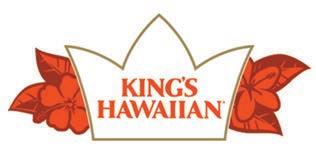
In addition to a robust national sampling tour, we also have significant omnichannel and in-store retail support planned. We plan to kick off during fall football and the holidays and to go big with media support in the weeks leading up to the Big Game. Our TV commercials featuring Peyton and Eli Manning will also continue airing, letting consumers know about Pretzel Bites and encouraging them to stock up for their game-watch parties. We also have exciting partnerships with other popular national brands planned to provide shoppers with easy and delicious snacking solutions.
For more information, please reach out to your Irresistible Foods Group representative.



for personalization efforts,” says Sinclair. “While still early, we’re pleased with the progress we’re making and the learnings we’re gathering from our loyalty test. Signups and scans are meeting and even slightly exceeding our early goals. We plan to extend this test to a couple more markets in early 2025 to accelerate our learnings that will inform our rollout later in 2025.”
Right now, through the Sprouts app, shoppers can get exclusive offers, clip digital coupons, view the weekly ad, and order groceries for pickup or delivery. App users are also the first to hear about exclusive offers and get the weekly ad early on Tuesdays.
Another area that plays a key role in the Sprouts customer engagement strategy is social media. As a result of new
























social marketing efforts, the retailer is seeing more new customers, improved customer retention and increased shopping frequency, leading to strong comp traffic momentum.
“Our team has brought our unique assortment and experience to life and has found willing partners with many influencers and celebrities, whose products and purposes align with ours,” observes Sinclair. “What is even more encouraging is seeing authentic posts from our customers, sharing their experiences in-store and with our products.” According to Sinclair, the retailer is also seeing younger customers in its stores.
“That 18-to-34 cohort is one of the ones where we’ve seen the strongest growth,” he affirms, “and I think that’s a credit to our marketing team and the work they’re doing in social media and bringing in those younger customers. We’re pleased with where we’re headed there. To further support our long-term customer engagement, we’re investing in technology to build a customer data foundation to tailor and personalize our customer communications.”
To meet the needs of its health-conscious customers, Sprouts is always growing its assortment of differentiated products. The assortment at Sprouts is curated to cater to the company’s “health enthusiast customers.” To highlight a few examples, the retailer is always looking to expand its range of organic produce, which is experiencing faster growth than conventional produce. Organic produce now comprises more than 46% of total produce sales at Sprouts.











Another focus is store brands, which contributed 23% to total sales for the latest quarter. Sprouts offers thousands of items from its private label Sprouts Brand, more than half of which are non-GMO or organic. From everyday staples to innovative specialty items, Sprouts Brand products meet strict quality standards while delivering value, novel flavor profiles and quality. The company often customizes flavor profiles and refines ingredients to suit Sprouts’ standards for quality, taste and value.
“Our Sprouts brand continues to grow and gain affinity with unique items and attributes that our customers desire,” notes Sinclair. “We have released more than 300 new Sprouts brand items this year, such as Italian-made stock gnocchi, frozen risottos sourced from Italy, and our latest Moroccan and al pastor-flavored chickpeas.” Most recently, it launched a line of more than 130 premium body care and home fragrance items under the Real Root by Sprouts brand.
“We’re very excited about the launch of Real Root by Sprouts,” says Sinclair. “They’re free from many things, including parabens, phthalates, [and] artificial fragrances and colors. These products help customers live healthier, nurturing inner and outer well-being.”
To showcase its differentiated products, Sprouts held several in-store experiences throughout the third quarter. In July, it debuted the first Sprouts Brand Discovery Days, during which customers explored the latest trends and new better-for-you products. Additionally, the retailer’s back-to-school event focused on healthy school snacks and lunch offerings.
Sinclair says that keeping customers happy starts with keeping employees happy, and the company is working hard to do just that.
“We’ve worked hard to create a culture that attracts, develops and retains top talent, building ‘Sprouties’ for the long term,” notes Sinclair. “We recently held our annual SproutsCon conference, which brought together all our store managers and various department managers, with over 1,600 team members in attendance. During the event, the operations team learned about our business initiatives, received leadership development training, and were introduced to new products in our innovation pipeline, some through live vendor pitch slams.”
More than 1,500 vendors attended the private show to discuss their products, allowing each team member to bring back their knowledge to the stores and share it with their customers and fellow team members.
“Our HR teams are focused on coaching and leadership training this year to build new leaders and our talent engines to support our growth objectives,” says Sinclair. “They’re doing a great job.”
In 2023, Sprouts created 3,000 new jobs, promoted more than 20% of its team members and filled 64% of store manager positions with internal candidates. It also provided 800,000-plus training hours across the business.
The retailer will continue to prioritize workforce diversity — 54% of 2022 promotions were female and 48% ethnically diverse, and VP-plus roles are 21% female and 16% ethnically diverse — building careers by providing devel-


opment opportunities via investment in training and internal and external leadership education programs, and offering competitive entry wages, robust benefits and mental health support.
On the ESG front, the retailer is working with a top consultant on developing carbon reduction targets; focusing on selling products with lower carbon impact (i.e., plant-based and organic), building smaller stores and placing them closer to distribution centers (88% are within 250 miles); employing energy management options (LED lighting, CO2 and lower-GWP refrigerants); and exploring renewable-energy programs (on-site solar and off-site renewable projects).
“Our operations team is laser-focused on delivering exceptional customer service and an in-store experience that fosters long-term loyalty,” says Sinclair. “This commitment to bringing our unique products to life through exemplary service, engaging sampling and in-store execution continues to set us apart and win customers.”
This year’s Impact Awards shine the spotlight on a range of grocery industry retailers, suppliers and solution providers that are doing good in various ways. By PG Staff
ne of the most important roles that grocery industry companies undertake is that of being good stewards in the area of environmental, social and governance (ESG) investments. As shown by Progressive Grocer’s 2024 Impact Awards, which this year boasts an impressive 75 honorees, chosen from close to 200 nominees across retailers, CPG companies and solution providers, this impetus to make the world a better place is stronger than ever. PG recognized companies’ outstanding achievements in the following categories: Community Service/Local Impact; Diversity Equity, Inclusion and Belonging; Educational Support/Learning Advancement;

COMMUNITY SERVICE/LOCAL IMPACT
Associated Wholesale Grocers Inc.
Each year, AWG Cares, the employee charitable foundation for Associated Wholesale Grocers, sponsors an Annual Day of Service dedicated to providing voluntary service in each of its communities. Volunteers from each location in AWG’s footprint participate in various local community service projects, including community beautification, packing boxes for local food banks or shelters, and volunteering at local charity events. Throughout the year, AWG employees at all divisions also regularly participate in various clothing and/or canned food drives.

COMMUNITY SERVICE/LOCAL IMPACT
Brattleboro Food Co-op
A 2023 bylaw change meant that shareholders of this Vermont food cooperative could now receive a “working shareholder” discount by engaging with one of its Commitment to Community (C2C) partners. Shareholders volunteering at least two hours per month with a C2C nonprofit earn a 5% discount. Additionally, shareholders can donate their hours to those unable to volunteer, thus further expanding access to the co-op. Last year, participants in the co-op’s Food for All program who also volunteered with a C2C partner earned a 15% discount. The result? A 55% increase in the number of hours that shareholders volunteered.
Ethical Sourcing/Supply Chain Transparency; Food Security/Nutritional Leadership; Philanthropic Innovation/ Corporate Giving; Sustainability/Resource Conservation; and Workforce Development/Employee Support. Whether doing good works at home or abroad, with the aim of benefiting local communities or potentially millions around the globe, all of the Impact Award recipients stepped up to the plate to improve the status quo and assure consumers that they’re walking the talk when it comes to ESG measures.
Read on to find out more about — and be inspired by — the 2024 Impact Award honorees’ actions in this space.

COMMUNITY SERVICE/LOCAL IMPACT
Giant Food
The Giant Gives Grant allows the Ahold Delhaize USA brand’s associates to make a meaningful difference by donating $300 for an individual volunteer grant or $500 for a group volunteer grant in their name(s) to a nonprofit with which they have volunteered 10 hours individually or 20 hours as a group. By facilitating these grants, the chain not only encourages associates to volunteer, but also gives them the means to support the causes they care about. In 2023 alone, its associates collectively dedicated 1,800-plus community service hours.

COMMUNITY SERVICE/LOCAL IMPACT
Heritage Grocers Group LLC
Heritage Grocers Group’s commitment to community service and corporate giving is shown by the philanthropic efforts of the Cardenas Markets Foundation, Tony’s Charitable Foundation, and Manos y Corazones Unidos, the recently established philanthropic arm of El Rancho Supermercado. Each strives to help those in the wide-ranging and diverse areas in which Heritage operates. They are deeply rooted in their local communities and are always searching for opportunities to give back to organizations committed to disaster relief efforts, advancing health and well-being initiatives, children’s well-being, hunger relief, and education.
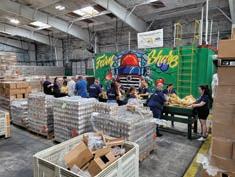
COMMUNITY SERVICE/LOCAL IMPACT
This year, J&C developed a new partnership with Caring for Miami, which gets basic critical resources to underserved families. J&C provided a monetary donation, along with employee volunteers who packed 500 bags as weekend meals for children on meal plans at school. In addition to partnerships focusing on food security and nutrition, the company partners with Operation Christmas Child during the holiday season. As J&C grows nationally, it will continue to expand its relationships with South Florida-based organizations.

COMMUNITY SERVICE/LOCAL IMPACT
Luker’s Chocolate Dream program aims to address challenges faced by cocoa-producing regions in Colombia, including the high rate of migration of youth to urban areas due to violence and economic issues, and the deterioration of ecosystems. The company collaborates with diverse stakeholders to establish long-term relationships centered on chocolate, crafting brighter futures tailored to each region’s needs. Luker also works closely with the farmers and local community, as well as offering its clients, which include chocolate brands and food companies worldwide, the opportunity to invest directly in these initiatives.

COMMUNITY SERVICE/LOCAL IMPACT
In 2023, Village Super Markets, which operates ShopRite, Fairway and Gourmet Garage stores, launched its first annual Pennies for Produce campaign with America’s Grow-a-Row, a nonprofit that supplies the retailer’s trade areas with produce. Not only was this a front of store campaign, but Village also did volunteer farm days with its associates, planting and helping harvest the produce to be sent to its store’s communities. With shoppers invited to join as well, the effort raised more than $67,000 in its first year, equating to about 335,000 servings of produce.

Circana established the volunteer, employee-led Diversity Advantage Program (DAP) in 2021 to help level the playing field for minority- and women-owned small CPG businesses to grow. DAP provides valuable consumer data, coaching and consultancy services, guiding participants toward business growth and success. Now in its third year, DAP has grown to 58 participants and gained the support of 250-plus U.S. and U.K. Circana employees, who contribute more than 15,000 volunteer hours annually in support. The program is strengthened by collaboration with such retailer partners as Amazon, Kroger, Target and Walmart.
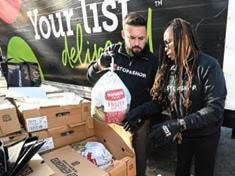
COMMUNITY SERVICE/LOCAL IMPACT
Stop & Shop
Stop & Shop launched the Turkey Express program to tackle the issue of food insecurity during the holidays. By distributing Thanksgiving turkeys to hunger relief organizations across the Ahold Delhaize USA brand’s market area, the initiative aimed to help needy families. Stop & Shop actively engaged both associates and shoppers in the program: Associates participated in the planning and execution phases, while shoppers could contribute through in-store promotions and awareness campaigns. The retailer aims to integrate more community events to further raise awareness and foster a culture of collective action against food insecurity.

Diversity, equity, inclusion and belonging is woven into the fabric of Dollar General’s (DG) 20,000-plus stores, 32 distribution centers, fleet teams and corporate office, as well as the communities it serves, through such initiatives as My Difference Makes a Difference, which enables employees to share their stories of uniqueness and diversity, and how showing up as their authentic selves has helped unlock their potential at work. Further, in the past two years, DG has seen a 250% increase in employees joining employee resource groups organized around chosen commonalities.

Understanding that schools are integral parts of communities, Tops Markets encourages shoppers to participate in its Tops in Education program by selecting their K-12 school of choice and purchasing Tops branded products. The company then contributes 5% of those sales to the designated school. To date, Tops has donated more than $1.7 million through the program. The grocer also supports education by providing scholarship opportunities to its associates and their dependents. So far, Tops has awarded 26,700-plus scholarships totaling more than $25,000,000.

EDUCATIONAL SUPPORT/LEARNING ADVANCEMENT
BriarPatch Food Co-op
Under the Apples for Gardens program, BriarPatch Food Co-op each month donates 10 cents per pound of apples sold to a selected school or nonprofit-run community garden. The money raised goes directly toward garden educators, plants or infrastructure. As extracurricular educational opportunities like school gardens are frequently the first to face budget cuts, BriarPatch’s program helps ensure continued support for these valuable learning tools. Donations to gardens have totaled more than $50,000 since the program’s inception and continue to edge upward as community awareness spreads.
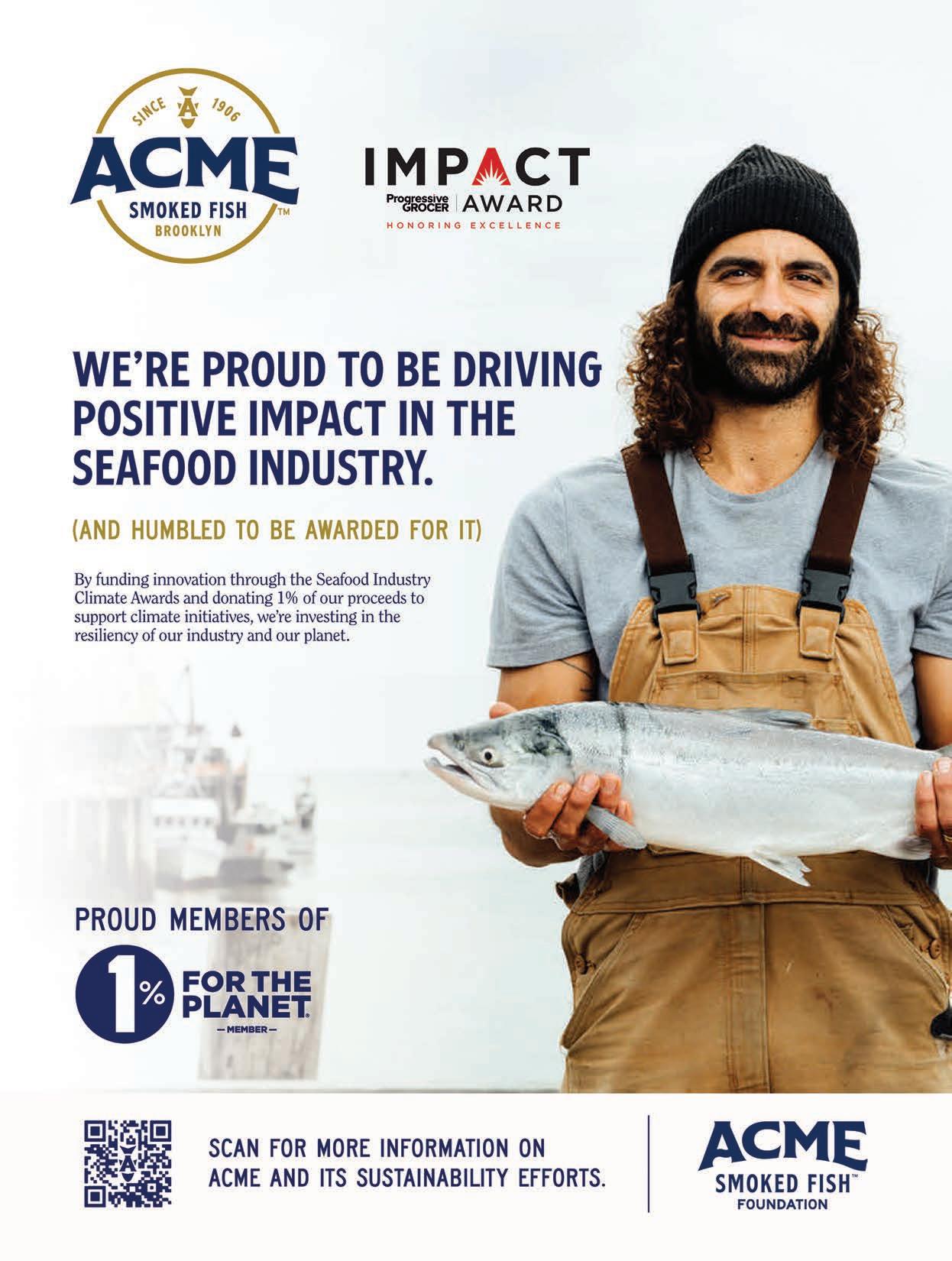



EDUCATIONAL SUPPORT/LEARNING ADVANCEMENT
Lunds & Byerlys
As traditional meat-cutting trade programs became obsolete and many grocers shifted to pre-packaged meat, the necessary industry skills evolved. In response, Lunds & Byerlys developed a seven-month training program encompassing classroom learning, hands-on experiences and eld visits. So far, the program has sponsored 16 culinary professionals, achieved 95% retention of trainees and facilitated expected career advancements. Customer satisfaction and demo sales in the meat and seafood department have risen as well. Following the program’s success, the retailer has launched a deli and foodservice culinary professional program, with more such programs in the works.

EDUCATIONAL SUPPORT/LEARNING ADVANCEMENT
The Raley’s Companies
First created in 2016, Raley’s Store Team Leader Tracker (STL) Program helps individuals who want to move up to the position of store manager. The program is intended to further develop leadership traits, management fundamentals and business acumen. In 2023, the program launched at Raley’s banner Bashas’, and the results were compelling: 14 of the 22 STL Leadership Track participants were promoted. Across the enterprise, there have been 167 total graduates, over eight different programs/years, with an 84% retention rate since the program’s inception.
EDUCATIONAL SUPPORT/LEARNING ADVANCEMENT
In April 2024, The Milk Processor Education Program (MilkPEP) launched “Dairy Diaries,” a sh-outof-water journey into the world of dairy farming, which premiered on streaming service Roku. In the humorous ve-part series, sketch comedian and actress Vanessa Bayer took viewers behind the scenes at Beck Farms, a fourth-generation dairy farm in upstate New York. Halfway through its third week on Roku, “Dairy Diaries” had already reached 86% of its target impressions. The campaign received more than 124,000 digital impressions, 224 million-plus earned-media impressions, 509 earned-media placements and 96.6% positive sentiment.

EDUCATIONAL SUPPORT/LEARNING ADVANCEMENT

EDUCATIONAL SUPPORT/LEARNING ADVANCEMENT
NielsenIQ
In response to the efforts of brands and retailers to make the business case for sustainability, NielsenIQ (NIQ) partnered with McKinsey & Co. to do a deep analysis of ve years of data across the entire store of sustainable brands. Through the research, they were able to identify the business case and key insights to help guide the entire industry. A subsequent white paper has been viewed more than 25,000 times and downloaded 3,000 times from the NIQ website. Additionally, webinars and industry presentations have reached 5,000plus industry leaders across more than 20 industry events.

Western Michigan University
With a 100% job placement rate and multiple alumni in senior leadership roles throughout the industry, the Western Michigan University (WMU) Food Marketing program focuses on teaching the fundamentals in category management, professional selling, supply chain management and retail merchandising, while heavily applying these concepts through industry-leading engagement with top retailers, CPGs and agencies. WMU offers the only university-based certi cation for category management in the country. What’s more, the program’s participants are 70% female, which is contributing to increased diversity in leadership roles in the food industry.

EDUCATIONAL SUPPORT/LEARNING ADVANCEMENT
The Giant Co.
In celebration of its partnerships with local agricultural producers, on National Farmer’s Day (Oct. 12) in 2023, The Giant Co. revealed a $20,000 donation to support education programs for future food and agriculture leaders. In partnership with Future Farmers of America (FFA), the grocer is supporting more than 5,000 high school students through leadership conferences and programming. FFA is a youth organization that prepares members for premier leadership, personal growth and career success through schoolbased agricultural education. More than 500 FFA chapters comprising 36,000 students span The Giant Co.’s four-state footprint.

EDUCATIONAL SUPPORT/LEARNING ADVANCEMENT
Albertsons Cos.
Through Albertsons Cos.’ Responsible Seafood Program, the retailer is working to improve transparency within the seafood supply chain. This not only helps Albertsons’ customers feel condent in the source of its products, but also supports the protection of ocean resources and the fair treatment of those working in the shing industry. Additionally, all seafood products sold under the grocer’s Waterfront Bistro and Open Nature brands display the Responsible Choice logo, indicating which products meet Albertsons’ Responsible Seafood Policy and Commitment and making it easier for shoppers to identify such products.

EDUCATIONAL SUPPORT/LEARNING ADVANCEMENT
Big Tree Farms
Ethical sourcing is at the core of Big Tree Farms, a producer of coconut sugar and coconut aminos. The company’s vertically integrated supply chain is both Fair for Life and USDA Organic certi ed, ensuring that it meets rigorous social, environmental, and economic standards. This ethical foundation supports farmers and fosters long-term, positive impacts on their communities. Further, transparency is a cornerstone of Big Tree Farms’ supply chain: It uses Koltiva software to maintain real-time communication with farmer partners and ensure visibility in quality, pricing and sustainability.


































EDUCATIONAL SUPPORT/LEARNING ADVANCEMENT
Equifruit
Long-term contracts and Fairtrade International audits ensure that Equifruit pays its grower partners a non-negotiable minimum price reflecting sustainable production costs. The company’s 100% Fairtrade certification provides transparency, showing the origins of its bananas, the farmers who picked them and when. Additionally, Fairtrade certification requires farms to meet such rigorous standards as safe working conditions, no forced child labor, decent wages and promoting gender equity. Equifruit also pays a Fairtrade social premium of $1 per 40-pound case, used for projects chosen by farmers and workers to benefit their communities.

EDUCATIONAL SUPPORT/LEARNING ADVANCEMENT
Fairtrade America
Fairtrade’s West Africa Cocoa Program (WACP) is an example of the impact of reinvesting in farming communities. WACP aims to build the professionalism of Fairtrade certified smallholder cocoa-farming cooperatives in Ghana and Côte d’Ivoire, the origin countries for 60% of the world’s cocoa. Since 2016, it has focused on strengthening Fairtrade-certified farming organizations in delivering quality service to their members and becoming proactive business entities to their commercial partners. In that time, there has been significant growth in training across both countries as well as Sierra Leone, a promising new player in the world’s cocoa production.

EDUCATIONAL SUPPORT/LEARNING ADVANCEMENT
Hannaford Supermarkets
In 2023, Ahold Delhaize USA brand Hannaford Supermarkets continued the implementation of the Farmers Assuring Responsible Management (FARM) assessment tool across its dairy supply chain in collaboration with its private label milk supplier. The FARM assessment tool, which supports farmers in building excellent and safe work environments, is currently being used by more than 3,000 farms across the country. So far, Hannaford’s private label milk suppliers have completed FARM Workforce Development assessments on more than 220 farms across Hannaford’s entire geography, up from 70 by the end of 2022.
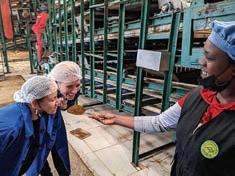
EDUCATIONAL SUPPORT/LEARNING ADVANCEMENT
Sarilla
Sparkling beverage brand Sarilla exclusively uses organic and fairtrade tea leaves and botanicals, ensuring sustainable sourcing and fair compensation for farmers. Its partnerships with Rwandan farmers have resulted in significant economic benefits: By providing fair wages and investing in local infrastructure, Sarilla has improved living standards and created a sustainable economic model. The company also supports genocide survivors in Rwanda through an annual crop-to-cup trip, which offers guests the opportunity to witness its impact firsthand. This initiative empowers these communities, providing sustainable livelihoods and honoring their resilience.










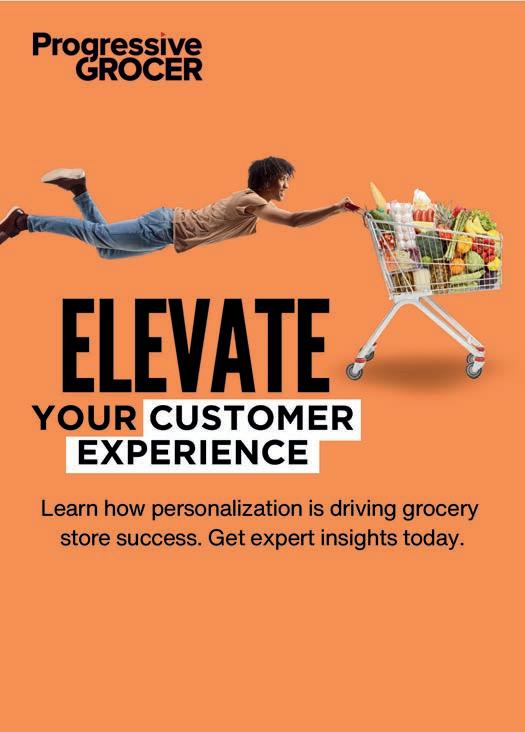

Stemilt first partnered with CIERTO, an organization with a mission of actively developing and sustaining a professional agricultural workforce that’s committed to returning to farms year after year, in 2018 to support 300 of its farmworkers. CIERTO streamlines the complex H2A visa recruiting and petition process so that growers can focus on running their farms profitably and efficiently, and workers can focus on their jobs, feeling comfortable and prepared. Today, 100% of Stemilt’s 1,616 H2A farmworkers come through the CIERTO program, and the company has a 95% return rate.

Earlier this year, Wiliot introduced its new Ambient Food Safety initiative designed to create completely transparent and traceable food supply chains – soon to be required for FSMA 204 compliance – through the adoption of battery-free, wireless ambient IoT technology. The initiative unites technology companies, standards organizations and food brands through the shared vision that ambient IoT is the most effective, scalable and low-labor approach to achieving safer, more sustainable and completely transparent food supply chains. Ambient IoT allows food products to be connected to the internet and AI at a fraction of the cost of legacy technologies.

The majority of food sold on Flashfood, a marketplace that reduces retail food waste by connecting consumers with deep discounts on products nearing their best-by dates, is fresh – 70% – meaning that it helps people save money on nutritious food. Flashfood has also expanded the availability of SNAP EBT as a payment method, enabling shoppers to stretch their dollars further. In April 2024, the company reached the milestone of 100 million pounds of food waste diverted from landfills, equal to 83 million meals and more than $250 million dollars saved.
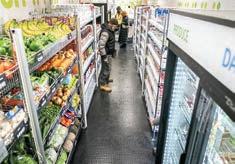
The Giant Eagle Mobile Market was developed and brought to life as a response to food access challenges in the grocer’s communities. Operating in Pittsburgh-area food deserts, the “grocery store on wheels” brings fresh, nutritious food to residents of 10 neighborhoods, visiting each stop once a week to ensure consistent access to products. The Mobile Market offers items across categories, including produce, dairy and meat, along with infant formula and senior nutritional supplements. It accepts SNAP and was the first market of its kind in Pennsylvania to accept WIC.









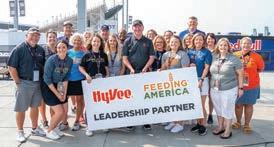
FOOD SECURITY/NUTRITIONAL
As inflation increased and federal SNAP benefits came to an end in 2023, food banks across the nation saw increased demand. Observing this need within its own communities, Hy-Vee decided to provide 100 million meals for people in need. To maximize the dollars generated, the grocer developed a partnership with Feeding America. Every $1 donated helps to secure and distribute at least 10 meals through Feeding America’s network of partner food banks. Fighting hunger has been a focus for Hy-Vee since it was founded more than 90 years ago.

FOOD SECURITY/NUTRITIONAL LEADERSHIP
Sifter’s platform is used by many businesses and organizations to build Food as Medicine solutions. Retailers turn to Sifter to personalize e-commerce and loyalty applications by matching grocery promotions and products to a customer’s specific health needs. Integration of Sifter’s barcode-scanning technology allows in-store shoppers to scan store products for a custom diet fit and health incentives. Meanwhile, dietitians can use the technology to create food scripts and medically tailored grocery lists, and Sifter also fuels produce prescription programs, supplemental food benefit cards and digital health apps.

The Kroger Co.
Kroger Health uses its Food as Medicine Initiative – a dedicated, educated and personalized ap proach to eating and enjoying fresh food – to prevent illness before it be gins. With this strategy, the grocer collaborates with industry experts to address how they all can make impactful changes in communities. Building on the momentum of the White House’s Conference on Hun ger, Nutrition and Health in 2022, Kroger hosted its first-ever Nour ishing Change Summit in 2023 and expanded the conference this year to solve the nation’s largest health needs and create viable solutions to fuel thriving communities.

Superior Foods International
Superior’s volunteers deliver weekly groceries to families with children battling cancer, ensuring that vulnerable community mem bers receive consistent access to nutritious food, and the company partners with a local organization to sponsor events and regularly help serve hot food at a daily free lunch program, among other food security endeavors. Additionally, Superior supports nutrition education through a culinary garden and teaching kitchen project at an elementary school and sponsors a cooking class for teens and a community garden enabling low-income residents to grow their own food.
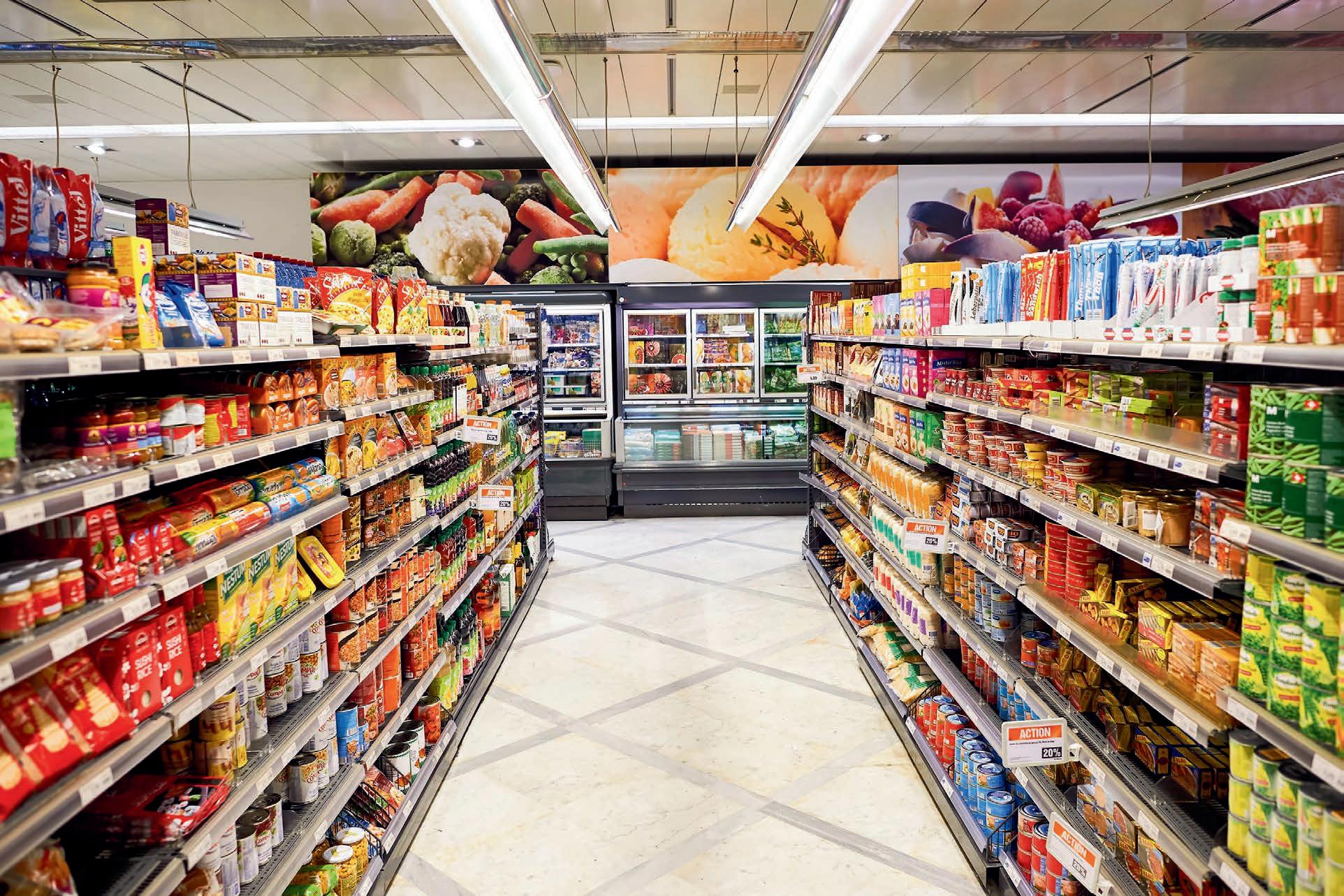
ny’s commitment to donate 1% of proceeds from the sale of Acme brand cold-smoked salmon retail products to fund the Seafood Industry Climate Awards (SICA), a program run by the Acme Smoked Fish Foundation, the philanthropic arm of the corporation. The signature awards program just celebrated its second year.
rates of food insecurity. During July, the private label brand donated one meal for every O Organics product purchased, resulting in the donation of $7 million, the equivalent of enabling 28 million meals. Donations were made to Nourishing Neighbors, the signature cause platform of Albertsons Cos. Foundation, to fund grants dedicated to providing healthy meals for at-risk youth throughout the summer.
In retail, every sale counts, and every sale starts at the shelf. Brain Corp empowers retailers to track and manage inventory with precision, ensuring the right products are on the right shelves, at the right prices. With our solutions, you’ll boost accuracy, enhance efficiency, and drive accountability throughout your store.

WANT TO LEARN MORE?







22M+


PHILANTHROPIC INNOVATION/ CORPORATE GIVING
Brookshire Grocery Co.
Examples of Brookshire Grocery Co.’s (BGC) many philanthropic efforts include the 34th annual BGC Charity Golf Tournament, which raised nearly $1 million dollars for charities, bringing the total funds raised more than $9.5 million since the tournament’s inception in 1988; the FRESH 15 race, which raised $180,500 this year for nonprofits in east Texas; and the Giving Back program, which has donated more than $785,000 to nonprofits that support education, hunger relief, military, first responders, health and wellness, and child and family well-being.

PHILANTHROPIC INNOVATION/ CORPORATE GIVING
Tipsy Spritzers
Tipsy Spritzers believes in leveraging its success to make a meaningful impact in the world, which is why the beverage company has committed to donating 1% of its profits to support organizations fighting human trafficking. This decision wasn’t just about giving back – it was a strategic initiative born from Tipsy Spritzers founder Katie Shields’ core values and a desire to create positive change in the communities it serves. Human trafficking is a pervasive and devastating crime that affects millions of people worldwide.
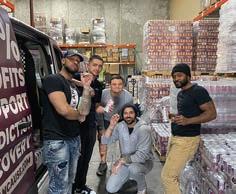

PHILANTHROPIC INNOVATION/ CORPORATE GIVING
CLEAN Cause Inc. is a mission-first venture in which 50% net profits –or 5% net revenues, whichever is greater – go to support individuals pursuing recovery from alcohol and other drug addictions. It does that by offering a better-for-you ready-to-drink yerba mate tea and through a giveback program that to date has donated $3.1 million-plus to the CLEAN Cause Foundation to grant recovery housing scholarships to more than 5,000 individuals. The company is also proud to hire a large number of individuals in recovery for its team.
PHILANTHROPIC INNOVATION/ CORPORATE GIVING
By funding water projects, fresh fruit and vegetable grower, shipper and importer Continental Fresh is helping to break the cycle of poverty and illness, fostering empowerment and opportunity in underserved Latin American communities. Its Water For All branded produce program donates a percentage of proceeds to BLUE Missions, facilitating the funding of clean water and sanitation projects that have provided access to clean water for more than 33,000 individuals so far. Through marketing initiatives and collaboration with supply chain partners, the program has garnered $150,000plus in three years.

PHILANTHROPIC INNOVATION/ CORPORATE GIVING
Each year, Traditional Medicinals prioritizes investment in source communities, partnering with farmers, wild collectors and local organizations. Just a few of its projects this year ensured that 4,000 people in Zimbabwe gained access to safe drinking water, 510 farmers in Madagascar were trained in good agricultural practices, and 2,300 women in Egypt enrolled in maternal and child health education and economic empowerment sessions. The company also explored the feasibility of bringing mobile health care to remote sourcing communities, including a remote island in the Philippines.
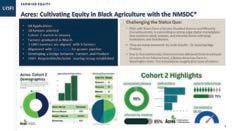
PHILANTHROPIC INNOVATION/ CORPORATE GIVING UNFI
Through the UNFI Foundation and a new corporate giving strategy, the distributor has undertaken initiatives that address the food system’s most pressing social and environmental challenges. For example, by both accelerating and specifically directing the foundation’s impact investment portfolio into the regenerative-agriculture sector, UNFI is helping make capital more affordable for farmers producing food in this way. In 2023, the UNFI Foundation made its first impact investment of $100,000 into MadCapital’s regenerative-agriculture fund, which seeks to transition 25,000plus acres of farmland to regenerative or organic practice.

PHILANTHROPIC INNOVATION/ CORPORATE
Food solutions company SpartanNash dedicated its annual Helping Hands Day volunteer event in June 2024 to providing disaster-stricken families with meals and personal hygiene products. The company rented out DeVos Place, in Grand Rapids, Mich., for the event, during which SpartanNash associates, supplier partners and volunteers of nonprofit partner Convoy of Hope packed nearly 15,000 meal boxes and 5,000 toiletry kits to help address immediate needs following disasters. Product donations exceeded $1 million, and SpartanNash also presented Convoy of Hope with a $100,000 check.

Afresh Technologies
Afresh helps grocers reach their environmental, social and governance (ESG) goals by reducing shrink. Its store ordering and inventory management solution creates intelligent inventory estimations based on such fresh-specific factors as perishability that power truck-to- shelf orders. By helping grocers run leaner backrooms, Afresh also helps boost sales, as food can more easily reach its highest and best use instead of ending up in a landfill or being used for compost. Afresh’s mission is to eliminate food waste and make fresh food accessible to all.
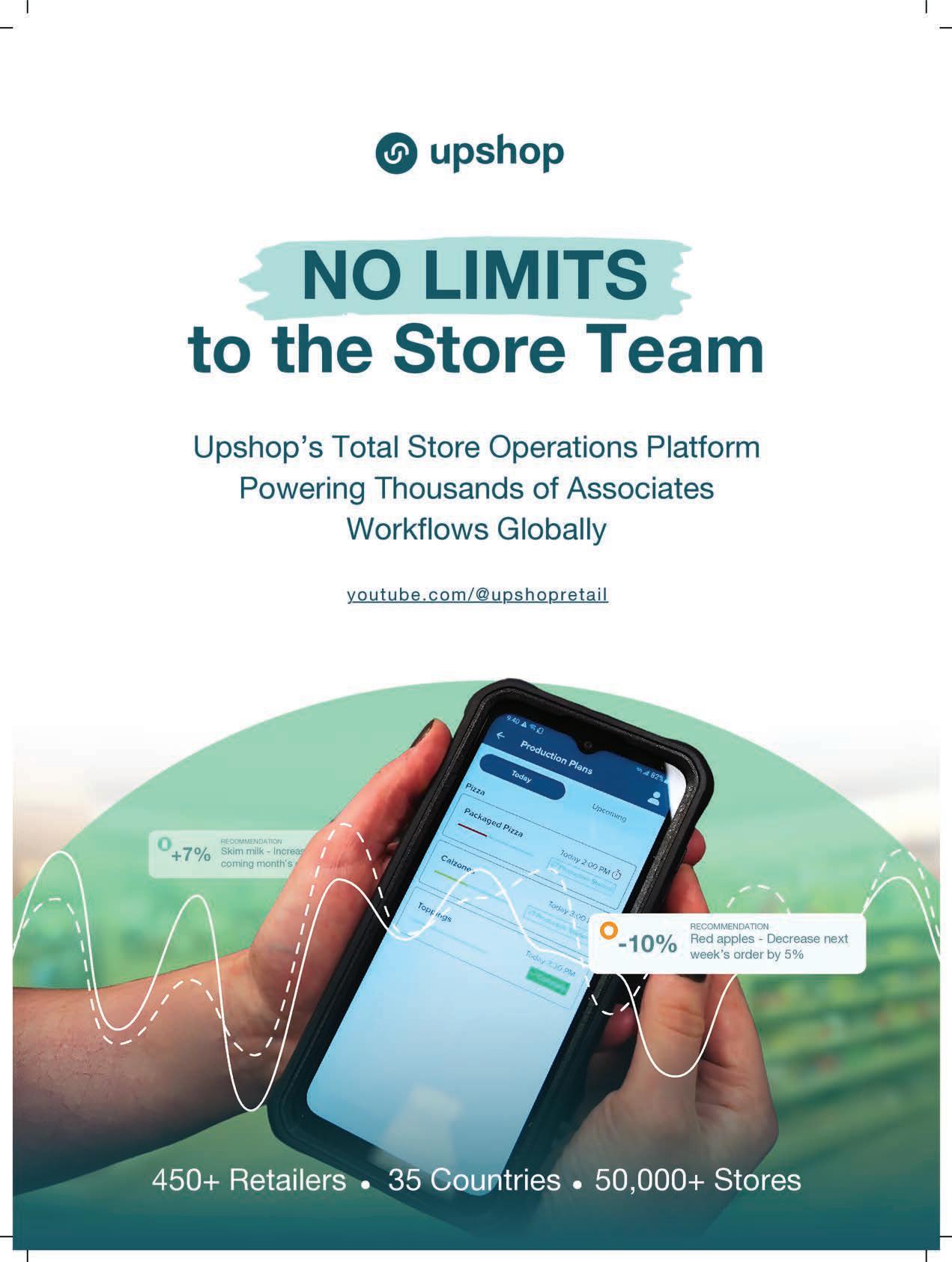



SUSTAINABILITY/RESOURCE CONSERVATION
In January 2024, ALDI revealed that it had met its goal to remove plastic shopping bags by the end of 2023, becoming the rst major U.S. retailer to do so. This decision has led to the prevention of nearly 4,400 tons, or nearly 9 million pounds, of plastic from going into circulation each year. Before eliminating plastic shopping bags from its stores, ALDI charged for plastic bags at checkout, a move that had already saved an estimated 15 billion bags from land lls and oceans.

SUSTAINABILITY/RESOURCE CONSERVATION
In early 2023, Cabot transitioned its retail cultured packaging – yogurt, cottage, sour cream and dips – to thermoformed containers made by Polytainers. This transition reduced the plastic resin in cultured packaging by 19%. By streamlining the containers and allowing more to t in a case, Cabot saw a reduction in corrugated cases of 17%. and inbound pallet usage of 18%. These reductions resulted in seven fewer trucks needing to be shipped to the co-op’s Montpelier, Vt., distribution center, which equated to a 16% reduction in emissions.
Among its various sustainability initiatives, AWG in 2023 diverted 32,430,794 pounds of food from land lls into such environmentally friendly options as recycling, reuse, energy, composting and land application. From January 2020 to December 2023, the company had diverted more than 122,316,012 pounds from land lls. Also during 2023, AWG recycled 2,309,000-plus pounds of polyethylene plastic lm through Trex, the world’s largest manufacturer of high-performance wood-alternative decking and railing. Since that program began in 2009, AWG has recycled more than 28,880,000 pounds of polyethylene plastic lm through Trex.

SUSTAINABILITY/RESOURCE
Cascades embarked on developing ber-based packaging to meet the urgent need for sustainable alternatives to plastic in food packaging, aiming to reduce the environmental impact by using recycled bers and promoting circular design principles. Another signi cant initiative is ensuring that its cardboard food trays are composed of 100% recycled bers from post- consumer recycled content, aligning with the company’s commitment to sustainability and addressing the demand for environmentally responsible packaging options. These efforts reinforce Cascades’ position as a leader in sustainable packaging solutions.

SUSTAINABILITY/RESOURCE CONSERVATION
Bay Cities
Bay Cities, a designer and manufacturer of packaging and displays, has implemented two major sustainability initiatives: a collaboration between New Indy and Encorr, and the Bay Cities Green Program. New Indy generates steam that powers Bay Cities’ 100% ef cient, zero-waste corrugator, Encorr. These facilities eliminate transportation costs through a bridge that directly delivers sheet rolls from New Indy to Encorr, reducing carbon emissions. The other program targets savings in energy, chemicals, fuel, and materials using at least 60% recycled content to lower operating costs and foster employee eco-consciousness.

SUSTAINABILITY/RESOURCE CONSERVATION
Dairy cooperative CDPI integrates sustainability into many facets of its operations. Project Sunshine is the co-op’s ongoing commitment to maintaining excellence and making progress in four critical categories: animal welfare, greenhouse-gas emission reduction, water conservation and renewable energy. CDPI member-owner farms have embraced climate-friendly practices and technologies to reduce their environmental footprint and promote long-term ecological health. An unwavering commitment to sustainability, animal welfare and environmental stewardship has positioned CDPI as a leader in the dairy industry, continuously striving to improve and innovate for a better tomorrow.

SUSTAINABILITY/RESOURCE CONSERVATION
Blackhawk Network (BHN)
In September 2023, BHN became the rst in its industry to transition its network-branded prepaid products distributed by third-party retail networks from plastic to paper-based materials, in partnership with Visa. The initiative rolled out in the United States, Canada and Australia. Converting to sustainable materials has the potential to affect more than 350 million open-loop and multi-branded products produced by BHN, and up to another 700 million third-party cards just in BHN’s network, with the the industry-level impact of this effort reaching far beyond that number.

SUSTAINABILITY/RESOURCE CONSERVATION
Denali
In 2024, Denali, one of the largest recyclers of grocery food waste, expanded its offerings by rolling out depackaging services across the United States to serve multiple retailers with a technology-driven process that increases food waste diversion from land lls by 60% and decreases compacter usage by 12% per store. This year, Denali expects to recycle 500 million-plus pounds of grocery food waste with this process and, across all of its services, to recycle more than 1 billion pounds of food waste, in partnership with about 10,000 grocery stores.



Retailers using robots are seen as innovative leaders who care about their shoppers.
Simbe’s shelf intelligence solutions power the most retail banners in the world

Divert’s commitment to preventing food waste and food insecurity is shown by its food recovery program with Giant Food, for which Divert recycles food that can’t be repurposed or donated into renewable energy. In the first year alone, the program processed nearly 31 million pounds of surplus food, mitigating nearly 1,400 metric tons of greenhouse-gas emissions. Additionally, by leveraging Divert’s proprietary data and waste reduction strategies, Safeway increased food donations by 20% within three months, reducing edible food waste by an average of 1,252 pounds per store per month.

SUSTAINABILITY/RESOURCE CONSERVATION
The Giant Co.
Building on previous efforts, in July 2023, The Giant Co. unveiled a $200,000 commitment to grow food system resiliency through the PA Farm Bill Urban Agriculture Infrastructure Grant Program. The Ahold Delhaize USA brand revealed the additional funding at the sixth annual PA Urban Ag Week tour at York Fresh Food Farm, in York, Pa. The partnership boosted total funding to $736,145 for state program aimed at increasing fresh food access in urban food deserts, addressing historical inequities and fueling community opportunities to thrive together.
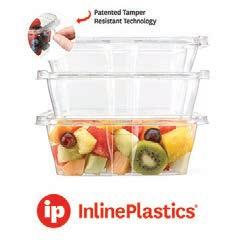
By integrating 10% post-consumer content throughout its PET portfolio and continuously striving to increase this percentage, Inline Plastics sets a high standard for environmental responsibility. Despite high demand for post-consumer materials and a global recycling rate of only 9%, the company maintains its quest to enhance sustainability practices. Further, its adoption of rDPETTM material not only incorporates post-consumer content, but also achieves a reduction of more than 50% in energy consumption during production of the sheet, leading to significantly lower carbon emissions than those of traditional sheet extrusion methods.
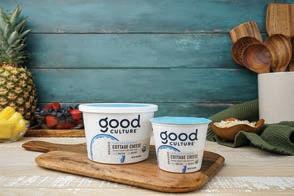
SUSTAINABILITY/RESOURCE CONSERVATION
Good Culture
Good Culture, a clean-label brand offering cottage cheese, sour cream and cream cheese, demonstrates its commitment to sustainability through partnerships with organizations like 1% for the Planet, Dairy Farmers of America for the Path to Pasture program, and the company’s B-Corp Certification showcasing higher standards for its workers, communities and the environment. The brand prioritizes the well-being of cows and the environment by sourcing milk from farmers who practice humane and sustainable farming. This approach benefits animal welfare and also improves the quality of dairy products.
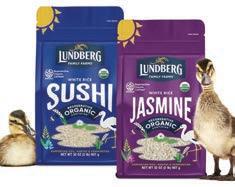
SUSTAINABILITY/RESOURCE CONSERVATION
Lundberg Family Farms
Earlier this year, Lundberg Family Farms became the leading U.S. Regenerative Organic Certified food brand, offering 70-plus products made with Regenerative Organic Certified rice across its portfolio in 2024. Last year, Lundberg was the first U.S.-grown rice brand to launch Regenerative Organic Certified rice. The company worked with the Regenerative Organic Alliance to certify more than 8,500 acres of rice – four times more than the previous year. The brand grows 70% of California’s Regenerative Organic Certified rice and plans to transition the rest of its organic acreage by 2027.
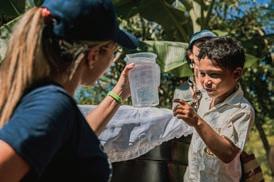
SUSTAINABILITY/RESOURCE CONSERVATION
GoodSAM
Known for its dried fruit chips, nuts, chocolate products and other items, GoodSAM has created positive, impactful change globally despite economic challenges and such major issues as inflation. The company also created a direct trade model that pays regenerative agriculture-focused farmers directly, thereby cutting out the middleman, helping to ensure a fair price, and allowing consumers greater access to high-quality organic and regenerative products. GoodSAM works on a developmental impact framework with each farming community to ensure economic stability first through its purchases.

SUSTAINABILITY/RESOURCE CONSERVATION
Milo’s Tea Co.
Milo’s Tea Co.’s approach to protecting the planet is simple: water stewardship, carbon reductions in manufacturing, and recycling and reuse of manufacturing waste. Since 2019, Milo’s has recycled and diverted 148,427 tons of waste, almost 300 million pounds, or the weight of more than 145,000 cars. During the same period, the company conserved almost 37 million gallons of water, as much as a 10-acre lake. Additionally, investing in renewable energy at its Bessemer, Ala., and Tulsa, Okla., facilities is a key part of Milo’s commitment to achieving carbon neutrality.

SUSTAINABILITY/RESOURCE CONSERVATION
Mowi USA
Seafood provider Mowi’s focus on reducing greenhouse-gas emissions, preventing deforestation and enhancing food safety demonstrates a comprehensive approach to sustainability. Its investment in post-smolt production is a strategic move that not only improves fish welfare, but also aligns with the company’s broader sustainability goals. By addressing such challenges as disease management and environmental degradation, Mowi is positioning itself as a leader in sustainable seafood production. Further, packaging innovations, such as an enhanced skin pack incorporating recycled plastic, show the company’s commitment to reducing waste and promoting circular economy principles.





EnsembleIQ is the premier resource of actionable insights and connections powering business growth throughout the path to purchase. We help retail, technology, consumer goods, healthcare and hospitality professionals make informed decisions and gain a competitive advantage.
EnsembleIQ delivers the most trusted business intelligence from leading industry experts, creative marketing solutions and impactful event experiences that connect best-in-class suppliers and service providers with our vibrant business-building communities.



















SUSTAINABILITY/RESOURCE CONSERVATION
Since 2015, New Barn Organics has been a pioneer, introducing the first Regenerative Organic Certified almond milk and nationally distributing Regenerative Organic Certified pasture-raised eggs. The brand has focused on several key initiatives to promote sustainability and resource conservation, primarily through regenerative organic farming practices. These initiatives include prioritizing Regenerative Organic Certified products, enhancing soil health through regenerative practices and ensuring high standards of animal welfare. These initiatives aim to address environmental issues, improve soil fertility and respond to consumer demand for sustainably produced food.

SUSTAINABILITY/RESOURCE CONSERVATION
Relocalize
Relocalize envisions a “truck-free future for food,” a concept that extends beyond transitioning major food supply chains to electric vehicles. Its autonomous micro-factories produce fresher, greener and more affordable packaged foods and beverages by co-locating food production, packaging and distribution near distribution centers. The company initiated a pilot project with its first customer, Southeastern Grocers, to operate the world’s first autonomous micro-factory for food manufacturing, supplying hyperlocal products to local Winn-Dixie stores. Relocalize has plans to launch two additional systems, collaborating with a total of three launch partners.
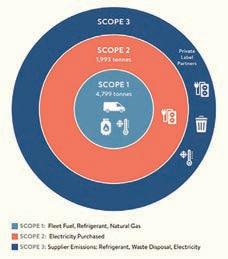
SUSTAINABILITY/RESOURCE CONSERVATION
In 2023, PCC adopted innovative approaches to offsetting and reducing scope 1 and 2 greenhouse-gas emissions, while scope 3 efforts were a new initiative focusing on a small group of PCC branded product partners as a pilot program. The retailer co-op tracks scope 1 emissions from fleet fuel, natural gas (usage in stores), and refrigerant and HVAC leaks and refills. Overall, store natural gas usage decreased 5% from 2022. For 2023, PCC purchased carbon credits supporting an improved cook stove program in Bangladesh to offset 100% of its scope 1 emissions.

SUSTAINABILITY/RESOURCE CONSERVATION
Co-op
In an effort to expand its responsible business practices, River Market started the Growers, Grazers, Makers and Bakers Producer Grant Program in 2023. The initiative assists with capital projects to enable producers to scale up their operations. In 2023, $7,000 grants went to three local farms whose projects promoted soil health, improved product quality, and increased efficiency in production and maintenance of fields, while 2024 grant recipients received nearly $8,000 in funding, with a focus on efficient human scale production, soil health and solar refrigeration projects.

SUSTAINABILITY/RESOURCE CONSERVATION
Phononic
Phononic stands out for driving cooling innovation while prioritizing environmental stewardship. Its solid-state cooling solutions are setting a new standard for energy use and sustainability. Phononic’s ACSTM Refrigerator and Freezer totes leverage solid-state technology, eliminating the need for harmful refrigerants and resulting in a global-warming potential impact of <1. By using thermoelectric cooling to transfer heat, the company’s cleaner cooling alternative reduces environmental impact while maintaining cold-chain compliance. Operating quietly and without mechanical complexity, the totes feature a modular design that unlocks demand-based cooling for grocers.

SUSTAINABILITY/RESOURCE CONSERVATION
RJW Logistics Group
With an asset-based model, a centralized inventory strategy and a full-scale retail logistics program, RJW cultivates business practices that yield long-term sustainability benefits for CPG customers, stakeholders, retailers and the entire industry. RJW’s aerodynamic trailers and idle reduction technologies are boosting fuel efficiency, allowing longer distances to be covered on a single tank of fuel. Further, the company practices proactive maintenance to minimize environmental impact while maximizing efficiency on the road, and its national tire program ensures extended tire life, reducing demand for new tires and conserving valuable resources.

SUSTAINABILITY/RESOURCE CONSERVATION
Pompeian Inc.
In 2023, Pompeian became the first olive oil brand in North America — and currently the only one in the world — to achieve Sustainably Grown Certification from SCS Global Services, an international leader in third-party sustainability and food safety certification, on its olive farms and olive oil, with its Sunrise Olive Ranch in California earning the first distinction. Until now, no olive oil brand in North America had received this third-party certification to ensure that its olive trees or fruit were planted, grown or harvested in a sustainable manner. The company has also adopted two trash interceptors, known as Mr. Trash Wheel and Professor Trash Wheel, that have removed 693 tons of litter and debris from Baltimore Harbor since the partnership began in 2021.

SUSTAINABILITY/RESOURCE CONSERVATION
SpartanNash
SpartanNash’s commitment to sustainability was epitomized by its Earth Day 2024 Planet vs. Plastics initiative. Central to this effort was its plastic bag recycling program to turn shopping bags into composite decking boards, reducing environmental impact and, when made into accessibility ramps, contributing to the welfare of local veterans. A partnership with composite-decking leader Trex led to a process ensuring that plastic bags collected at SpartanNash stores were recycled as durable decking boards, from which the company and Home Repair Services built ramps for veterans’ homes.

SUSTAINABILITY/RESOURCE CONSERVATION
SunOpta
Sustainability is at the forefront of SunOpta’s mission and operations. In 2023, the food manufacturer built on its legacy to shape the food and beverages that people consume, the way these products are made, and the communities where the company and its partners live and work. Key achievements included installing solar panels to reduce carbon dioxide, maximizing its warehouse network to reduce carbon dioxide emissions annually and saving water through plant-based production. Additionally, SunOpta made significant progress toward its zero waste-to-landfill goal.

can be used instead of fossil-fuel based materials for cartons’ plastic caps and coatings. In 2021, the company expanded production of shelf-stable cartons made with sugarcane-based polyethylene, which offers the same recyclability, functionality and food protection as traditional polymers, but it’s made from renewable materials with a lower climate impact. Seventy-seven million of these plant-based carton packages were sold in the United States and Canada that year; in 2023, the number increased to 1.4 billion.
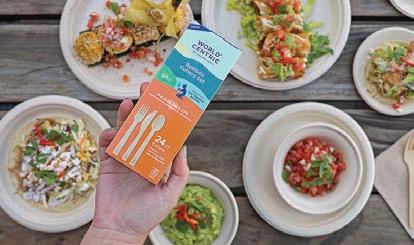
SUSTAINABILITY/RESOURCE CONSERVATION
World Centric
World Centric, a provider of plantbased, compostable packaging solutions for the foodservice industry, was founded in 2004 as a nonprofit organization to elevate awareness of global sustainability issues. As a Certified B Corporation since 2010 and a California Benefit Corporation since 2013, the company upholds rigorous standards of social and environmental responsibility. It donates at least 25% of net profits each year to organizations addressing social and environmental issues, with more than $17 million allocated to hundreds of nonprofit projects to date.
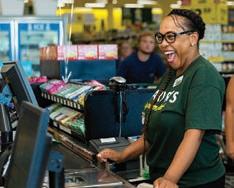
WORKFORCE DEVELOPMENT/ EMPLOYEE SUPPORT
In 2023, SEG established a five-year Belonging, Inclusion and Diversity strategy with such initiatives as enhancing its diverse interview panels and candidate pools, pay and promotion analysis, supplier program accessibility, and more. To help associates further advocate for themselves, the company offers various associate resource groups, including the Women’s Development Network, Emerging Leaders, SEG Pride, Pa’lante, African Americans FOCUS (Fostering Organizational Culture to Unite SEG), ASPIRE (Asians & Pacific Islanders for Resource and Education), Military Families, Working Parents Network, and MOSAIC (Mobility, Support, Accessibility and Inclusion in the Community).
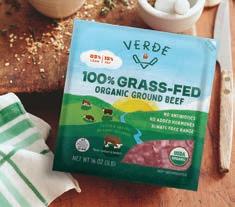
The biggest and most recent initiative from Verde Farms, the leading brand of organic, verified regenerative, 100% grass-fed and 100% pasture-raised beef in the United States, is earning its regenerative verification through Land to Market, the gold standard of regenerative agriculture. In spring 2023, Verde became one of the first companies to meet this rigorous standard, and the only organic beef company to do so. The company believes that its commitment is a cue to other top meat companies that livestock can be part of the climate solution.

W&P’s Reusable Stretch Wrap gives consumers a viable alternative to wasteful single-use plastic wrap that works just as well and is infinitely reusable, so they can eliminate waste from their kitchens and, ultimately, from landfills. Since the average American household uses 24 rolls of plastic wrap each year, W&P anticipates that in 2024, it will empower 47,000 households to eliminate 2 million-plus pounds of single-use plastic waste. The company is continuing to invest in the product line with the launch of convenient Reusable Stretch Produce Savers.

WORKFORCE DEVELOPMENT/ EMPLOYEE SUPPORT
Food retailers are investing in their team environment and associate experience more than ever before. Upshop’s total store operations app simplifies, enhances and interconnects the associate experience across the store. It effectively obviates the need for extensive institutional knowledge by systematically directing the appropriate tasks to the right associates at the right time. By synchronizing tasks across all departments, managers and corporate teams can achieve unprecedented visibility into store operations. The app also facilitates two-way communication between stores and headquarters for feedback, comments and corrective action.
PG’s current Category Captains show themselves to be masters of sales growth across the store.
By PG Staff
tore assortments and merchandising strategies may have changed over time, but one thing that hasn’t changed is the commitment of certain CPG companies to work with their retailer partners to boost the sales not only of the companies’ own brands, but also those across the entire category, and ultimately throughout the entire store. The 17 companies chosen by Progressive Grocer as its 2024 Category Captains have more than fulfilled this commitment, providing cutting-edge research, profound consumer insights, helpful guidance, and more to enable grocery retailers to rethink their approaches and up their games in creative ways with regard to a range of categories. Along with higher sales, these moves have led to deeper, more fruitful working relationships between those suppliers and retailers, which in turn have each strengthened their respective engagement with the consumer. Read on to find out how the following Category Captains earned their places among this year’s best sellers.
A national retailer had a market share gap of five points ($27.5 million) in the oral electrolytes category. Abbott conducted research to evaluate shopper behavior and purchase patterns to define a category strategy, with the aim of driving category growth and market share. The oral electrolytes category is a growth driver in the market, with the number of brands having increased 400% since 2019. Shoppers expect to find these products in three to four locations in the store, based on need state, with 83% expecting to find them in the beverage aisle. Abbott added to the retailer’s warm-beverage aisle new competitively priced Pedialyte products catering to different usage needs to drive awareness and penetration and capitalize on the increase in adult usage. The result: Pedialyte achieved the No. 2 share position in the isotonic warm-beverage set, behind Gatorade, and total buyers purchasing oral electrolytes has increased 4% since the launch.





In 2023-24, Chiquita’s EZ Vent Box accelerated expansion and transformed banana management for retailers, streamlining the transition from pallet to display. The packaging minimizes bruising, enhances back-room efficiency, provides an efficient ethylene vent and ensures consistent ripening through its advanced airflow. Additionally, handling time has been reduced to just a few minutes, saving stores significant labor each week. The solution effectively addresses labor challenges, minimizing shrink and improving the customer experience with high-quality bananas. During the same time frame, Chiquita launched diverse brand-building campaigns to strengthen consumer connections across various touchpoints. These campaigns employed stickers, boxes, digital platforms, out-of-home (OOH) advertising and social media to keep the brand relevant. Chiquita also partnered with key retailers for OOH co-branded campaigns to drive category attention and surprised in-store shoppers with Miss Chiquita visits. The introduction and expansion of permanent secondary displays to almost 2,000 stores secured cross-category as well as impulse shopping.



to be Category Captain 25 years in a row.

Chiquita is honored to be recognized for Category Management excellence for the 25th consecutive year.
For the 25th consecutive year, Chiquita is once again leading the way in the banana category by supporting retailers and driving growth for its clients. Chiquita is active on various fronts: driving efficiency and simplifying operations at the point of sale, optimizing the consumer experience with top-quality products (from bananas to plantains), bringing fun, art and culture to the community of banana lovers through breakthrough initiatives, and fighting for a more sustainable banana industry, thanks to the groundbreaking innovation of Yelloway One.
•EZ Vent Box: This innovative packaging improves efficiencies related to handling the fruit by minimizing bruising, enhancing backroom productivity, and ensuring consistent ripening with its advanced airflow.
•Yelloway One: The first non-GMO variety bred prototype to resist both Tropical Race 4 (TR4) and Black Leaf Streak Disease (BLSD). It marks a significant advancement in banana export production future.
•Brand Building: Diverse brand-building campaigns strengthened consumer connections across multiple touchpoints. These campaigns leveraged stickers, boxes, digital platforms, out-of-home (OOH) advertising, point of sales materials and social media to maintain the brand’s relevance.

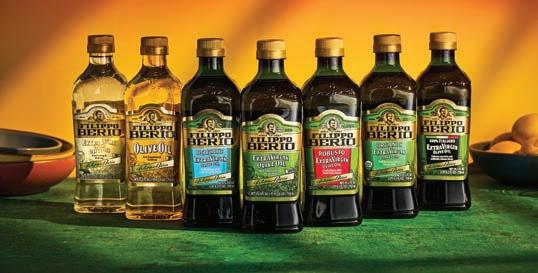
The extra-virgin olive oil (EVOO) category has experienced a 25% increase in dollar sales and a 4.4% volume increase, with Filippo Berio making the largest contribution, adding more than $51 million in sales. The brand’s refreshed EVOO lineup offers guidance on flavor profiles and a product for every cooking occasion. Filippo Berio supported this flavor expansion through press releases, in-store and online activations, and social media campaigns. Additionally, the company has the No. 1 branded pesto in the total U.S. food market. The category has grown 3.1% in dollar sales and 1.6% in volume, with Filippo Berio again making the largest contribution, adding $1 million-plus in sales. It offers the most extensive pesto selection in the market: eight flavors, including the first certified plant-based/vegan variant and an organic offering. To drive awareness, the company launched an integrated marketing campaign encompassing public relations, in-store activations, retail media and social media content.
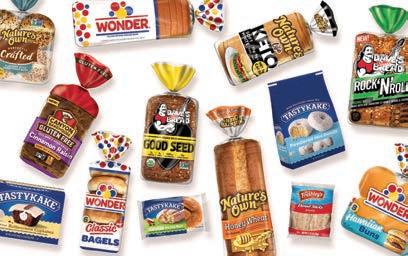
Flowers Foods collaborated with a major regional food retailer where it had distribution voids due to geographical challenges to its direct store delivery (DSD) system. Together, the retailer and Flowers created a new supply chain distribution method outside of its DSD network to deliver fresh, not frozen, packaged bread of its nationally recognized Nature’s Own, Wonder and Dave’s Killer Bread brands. The new distribution network uses the retailer’s existing transport system, a method unique to Flowers, given the highly perishable nature of its products. The collaboration also gave Flowers exclusive manufacturing rights to the retailer’s store-brand bread items. Flowers’ category team delved into store-level performance to determine demand expectations of its various brands, broke down sales expectations to determine necessary space allocation by store and by segment, and then developed new store-level schematics for spring 2024 that optimized category sales for the retailer, benefiting all bread brands, including store brands.

Heeding data showing that 83% of consumers are concerned about food prices and are building smaller baskets even as they eat more meals at home, Fresh Express collaborated with its retail partners to re-examine the depth and frequency of produce promotions, including value-added salads. To boost unit sales of items that appeal to shoppers for convenience and nutrition reasons, the brand made data-driven recommendations, like moving from “three for” multiples to “two for” or single buys, offering deep discounts and cross-promoting to build baskets. In addition to highlighting ways to optimize product usage while also reducing food waste, Fresh Express focused on product innovation in this evolving marketplace. The brand rolled out new globally inspired flavors to draw younger shoppers and supported the launch with planogram support, product tracking and panel insights for in-store and digital marketing campaigns. These aligned efforts helped boost dollar and unit sales and grew market share.
One might say that Frieda’s brings the passion to category management. One standout program focused on the specialty produce company’s passion fruit, grown by a women- and family-owned farm in Okeechobee, Fla. Frieda’s worked closely with a national retailer with a strong presence in the Southeast to create a program that shared the story of the grower and the fruit. The teams got the story directly, as the brand and retailer visited the farm in an immersive experience that laid the groundwork for tailored merchandising concepts. Those concepts included in-store displays, educational point-of-sale signage, and a QR code on the shipper that links consumers to usage tips and the grower’s background. This deeply rooted approach led to the launch of new products like a passion fruit 3-pack and expanded Freida’s share of the grower’s crop. Frieda’s passion fruit outgrew the category by more than 100 points in unit, volume and sales growth from June 2023 to June 2024.





11,000 pet lovers strong.
Where do thousands of pet lovers come together every day? Purina. And the best part is, Purina employees also happen to be experts. That’s a powerful combination—love and expertise—inspiring safe, best-in-class pet food solutions, and breakthroughs beyond the bowl like increasing pet adoptions, a cleaner environment and more.
The fifth time’s a charm. Thank you, Progressive Grocer, for the recognition.



Gallo may have a history of tradition, but its forward-thinking approach to products and promotions is garnering fresh attention and sales. The company’s nontraditional winebased ready-to-drink (RTD) offerings improved dollar sales trends in the wine category, stemming declines from -1.5% to -0.03%. The RTD product, ViBE by Vendange, is unique in that it’s a sweet, wine-based pre-mixed cocktail with broad appeal, including among those who haven’t traditionally engaged with wines. Available in such popular fl avors as Blue Raspberry Lemonade and Fruit Punch, the product was buoyed by a comprehensive marketing strategy and both digital and in-store elements like pop-up bins in c-stores, grocery point-of-sale materials, Instacart banners and Instagram ads. The product leads competing RTDs with a 26% repeat rate – a rate that’s helped by the product’s price point at 50 cents below other offerings. Other impressive stats include a 65% lift to the cart and a 44% lift to incremental purchases.
The Hershey Co. puts plenty of planning into category management efforts for products that are frequently unplanned purchases. One outstanding example is the CPG’s focus on beacon end caps and permanent secondary displays, which catch shoppers’ eyes and, ideally, their share of spend. Recognizing that displays prompt three in 10 unplanned candy purchases, Hershey enhanced visibility on beacon end caps, especially those leading down the confection aisle, which have been shown to drive 2.4 times stronger conversion versus other types of candy displays. The company tested beacon end caps in nearly 300 stores and found that those merchandising areas led to a 7% average dollar lift for those specific SKUs, a 2% bump in basket penetration and a 150-basis point increase in dollars, which was three times that of stores without such beacons. Accordingly, Hershey is adding another 200 of these beacon end caps by the end of 2024.
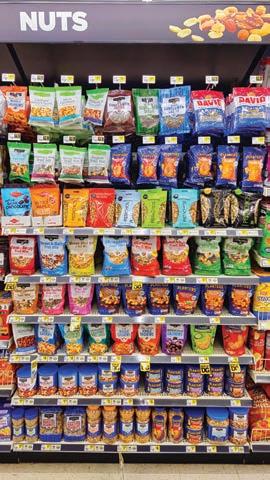
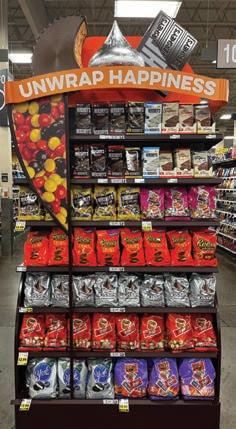
Stalwart CPG manufacturer Hormel Foods is helping to push forward the in-aisle snack nuts category, which has seen declines despite growth in general snacking. The Hormel Foods Shopper Insights team collaborated with brand and retail teams at Dollar General to uncover the factors influencing the decline and the challenges facing shoppers. The two companies used these insights to create a strategy to revitalize sales and re-engage shoppers in the category, introducing a new 6-ounce peanut segment that offered value and convenience with peggable packaging, as well as popular flavors previously found in other product types. After finding that flavored cashews were attracting new, younger shoppers, the team also recommended adding these items to the Dollar General assortment and was able to develop a best-in-class planogram tailored to Dollar General’s small-format, limited-SKU environment. The result was a refreshed shelf layout with improved brand blocking, assortment and shopability.
In an effort to ignite growth in the sauce and Mexican categories, Kraft Heinz launched consumer-driven, data-backed initiatives to help drive sales growth and improve shopper engagement. Last year, the company partnered with retailers to reorganize the flow of the sauce and condiment aisle, based on insights from Kantar and Mastercard Test & Learn analysis, redesigning the aisle layout to improve shopper engagement and implementing shelving principles that enhanced product visibility. Kraft Heinz also worked with retailers to redesign the Mexican food section, aligning the layout with how consumers make decisions, and reflecting the sequence in which shoppers select wraps, fillings and toppings for mealtime. Both initiatives have delivered strong results, emphasizing the role of sauces, dips and condiments in driving growth across both categories. The sauce and condiment aisle reorganization boosted sales across multiple subcategories, while the Mexican category growth initiative increased shopper engagement and brought new, younger households into the store.



















Mars Food & Nutrition introduced insight-driven omnichannel merchandising solutions to retailers throughout the United States and Canada in fall 2023 to help enhance rice and grains category sales. By investing in new shopper research that examines in-store motivation and decision-making hierarchies, as well as product selection factors, the company revalidated the consumer decision tree for the category, developed effective merchandising principles, and used digital insights to create search and navigation solutions to boost sales. Subsequent in-market tests with national retailers showed improvements in basket size and transactions in the rice and grains category. Additionally, Mars implemented digital navigation and search optimization solutions to help retailers maximize the effectiveness of their online platforms. Further, the company optimized shelf placement to highlight better-for-you options, which helped increase dollar sales and transactions at one national retailer.
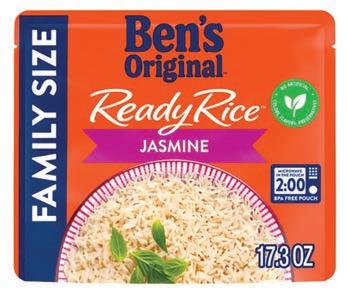























While Mission Produce has been an avocado industry leader for more than 40 years, it entered the mango category in 2021 and recently partnered with a major national retailer to launch a first-of-its-kind ripe mango







































































program in a single division. After fi nding out via its inhouse marketplace intelligence platform that ripeness is a key driver for not only avocado purchases, but also mango purchases, Mission Produce worked with research and development, operations, and inventory specialists, as well as mango experts, to build the category for ripe mangoes in the United States and kicked off the program. Mangoes were ripened before delivery as part of the program, which was tailor-made to the store’s merchandising strategy, with a goal to drive sales. Ripe mangoes resulted in both greater household penetration and increased purchase frequency during the fi rst six months of the program.


By earning B-Corp status, NatureSweet has set itself apart as a leader in the fresh produce industry, showing that profi tability can go hand in hand with responsible corporate citizenship. This initiative aligns the company’s business model with positive social and environmental outcomes. Committed to sustainable farming practices, NatureSweet uses less water in its tomato production through advanced irrigation techniques and reduces its carbon footprint by optimizing transport and packaging. NatureSweet also focuses on waste reduction in its production process. This includes both organic waste from the tomato-growing process and plastic waste from packaging. Since it became a B-Corp last summer, NatureSweet’s dollar sales have improved by 200 basis points compared with the rest of the snacking tomato segment, gaining 30 basis points in total U.S. multioutlet retail. NatureSweet buyers have increased by 2.2 million, or 7%, to 32.4 million, versus total hothouse snacking tomatoes increasing by only 1.4 million, or 3%.

Fresh Express is honored to have been selected as Category Captain once again by our valued retail partners




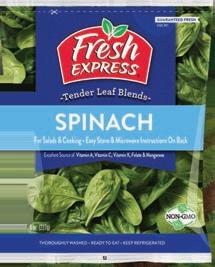

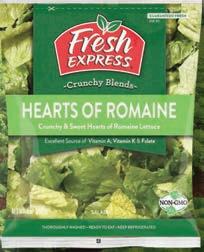


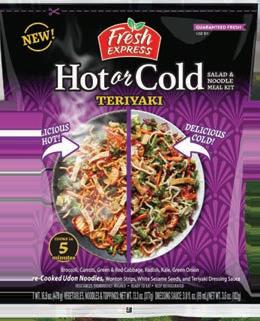














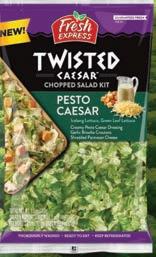


Nestlé Purina has augmented its category management function with a transparent AI planning system, enabling it to rapidly make optimized assortment choices, grow the pet category and empower retail partners with novel learnings. Since implementing explainable AI systems, Nestlé Purina can quickly layer together unstructured data including sales, market factors, customer profiles and planograms. Within a few clicks, the brand inputs a retailer’s goals and accurately projects the performance of different AI-generated or manual assortments at each store, as well as holistically within shopper groups. These impacts are quantified: at the high level to the category and customer, and at the granular level for each individual SKU and planogram’s subsequent sales, volume, rate of sales, loyalty change, and more. Nestlé Purina has enriched its collaboration with its retail partners, offering them meaningful insights that were previously hard to extract. The company can also predict at each store how much increased or decreased space for categories and subcategories will affect the demand of others.



Pharmavite’s category management team, along with its corporate internal teams, have a deep understanding of the vitamin category. This knowledge helped develop actionable data insights to share with retail buyers, leading to category strength and growth. In the past year, Nature Made introduced Magnesium Glycinate and Zero Sugar Gummies in response to gaps identified in the market. Pharmavite ran always-on digital events via social media and collaborated with retail media partners. Its digital marketing efforts drove additional purchases through algorithmically proven co-purchase opportunities. At the time of publication, the Magnesium Glycinate Gummies were Pharmavite’s No. 1 growth SKU within multioutlet retail in last 52 weeks. Pharmavite continues to address supply gaps for retailers to maintain category sales. It connects directly with retail partners on a weekly basis to coordinate demand planning and keep inventory levels at minimum thresholds. Pharmavite maintains vitamin category growth by supporting retailers through product availability challenges driven by other suppliers.


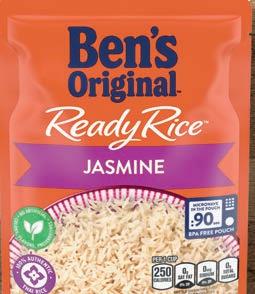


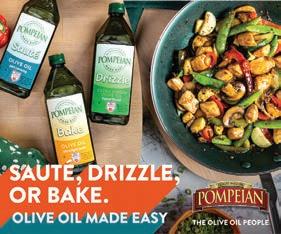
Pompeian has introduced innovations to store shelves to address consumer confusion, launching its Made Easy Olive Oil collection comprising four oils highlighting distinct usage occasions: Bake, Fry, Sauté and Drizzle. Pompeian extended these education efforts to retail partners, showcasing the ease of using Made Easy in ads for Walmart and Amazon. As category captain for Amazon and ABCO, Pompeian regularly connects with partners, provides insights to develop category strategy and recommends aisle best practices. Additionally, the company drove brand and category awareness through its Can Your Fat Say That? campaign, a scroll-stopping initiative to make consumers question their cooking oil choices, and why olive oil, specifi cally Pompeian, is superior. Using paid social media and digital out-ofhome, Pompeian drove scale and awareness in and around the store. Through brand lift studies, the ads demonstrated a 5% lift in purchase intent and an 18% lift in brand favorability. Pompeian also increased unit loyalty by 1.9 points.


Sweet Loren’s is redefining the future of the refrigerated dough category. With a bold brand story, leading insights and game-changing innovation, the company provides retailers with a solution for driving incremental sales growth. Sweet Loren’s shoppers are the highly sought-after younger generation looking for better-for-you options. According to the company, Millennials and Gen Zers spend 44% more per trip on cookie dough, leading the pack in buy rates, dollars per unit, and trips. After learning that almost half of shoppers are seeking reduced-sugar options, Sweet Loren’s introduced a “Less Sugar” version of its best-selling Chocolate Chunk flavor. Consumer insights also led to the launch of a Salted Caramel Chocolate variety, which drove incremental sales and quickly became the No. 2 dollar velocity item in the brand’s portfolio. Additionally, seasonal innovation experienced success with a Pumpkin Spice flavor — 48% of its buyers were brand-new, and half of them came back for more within 12 weeks.







Progressive Grocer's Grocery Impact event, which took place this past Nov. 6-8 at the Hyatt Regency Grand Cypress Resort, in Orlando, Fla., featured impactful educational sessions on a range of key topics for food retailers, the presentation of PG's GenNext Awards for emerging industry leaders under the age of 40, and plenty of time for networking and socializing.




As the culmination of Grocery Impact, the Top Women in Grocery (TWIG) gala on the evening of Nov. 8 provided plenty of special moments for honorees and their supporters. In addition to the Senior-Level Executives, Rising Stars and Store Managers who received awards, Trailblazer Lynette Ackley, of Meijer, was recognized for career achievement. Following the ceremony, attendees hit the dance floor at an afterparty sponsored by The Hershey Co.





Thank you to our quality partners in deli and congratulations to the 2024 Top Women in Grocery!


NEW YEAR.
By Lynn Petrak
f protein is a go-to source of energy, so, too, is the marketplace for protein-packed products. Headed into a new year — and the midpoint of the 2020s — shoppers continue to show a penchant for animal-based proteins and some plant-based proteins.
“There’s no denying that protein is in the limelight,” affirms Rikki Ingram, director, beef and pork marketing at Springdale, Ark.-based Tyson Foods. “In fact, Americans’ desire to consume more protein is on the rise, up to 71% in 2024, compared to 59% in 2022, according to the 2024 IFIC Food & Health Survey. Exactly which protein source consumers navigate toward remains varied.”
The meat department is one source that has benefited from demand by consumers who continue to cook at home. According to data from Chicago-based insights firm Circana, meat department sales are expected to hit $102.8 billion in 2024, up from $99.8 billion in 2023. In addition to moving the needle on the $100 billion milestone, meat departments experienced a lift in volume, moving 22.6 billion pounds in 2024 versus 22.3 billion in 2023, indicating that dollar sales weren’t just fueled by inflation.
Another recent report from San Antonio-based 210 Analytics and Circana supports the solid performance in the fresh meat sector. According to their research, October was a “monster” month for fresh meat, with sales up 4.9% during that time frame compared with the prior year. The gains were led by lamb (up 11.5%) and beef (up 7.5%), while pork also had a nice showing, with a 6.1% boost in pounds sold.

Ingram notes that many factors go into shoppers’ decisions about the protein they put in their baskets. “It is important to keep in mind that consumers are increasingly seeking value, and value does not always equate to price,” she notes. “Consumer values are dependent on the individual and can include quality, health, nutrition and more.”
Circana’s other data points support that notion, as the firm’s insights indicate that the top drivers are, in order, taste, price, health/nutrition, and ease and speed of preparation. While those factors have long shaped shopper behaviors, consumers have tweaked some of their protein-buying habits: According to a recent webinar on meat trends presented by the Meat Institute,
Cook-at-home consumers are seeking out quality proteins like this Prime boneless loin from the Prairie Fresh brand.
Proteins have benefited from demand by consumers who continue to cook at home.
Top drivers for protein purchases are taste, price, health/nutrition, and ease and speed of preparation.
E merging protein trends include valueadded products, inexpensive cuts, different forms and sustainability.














Your customers are grateful for your commitment to offering the best-tasting and best-sourced beef available, and so is Certified Angus Beef. Congratulations!














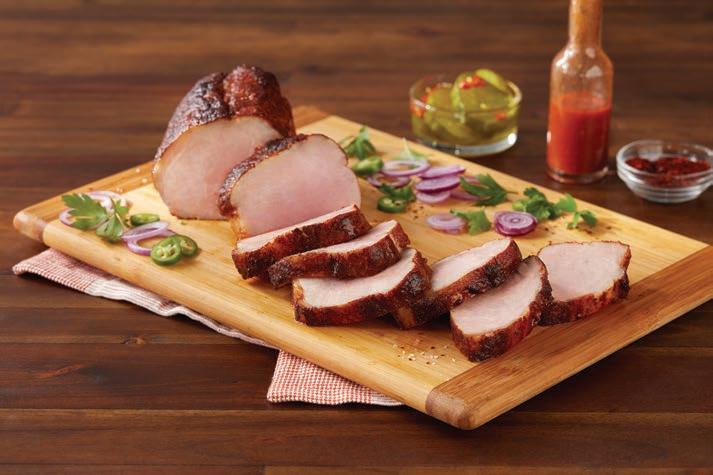
Protein Pact and Amcor, 76% of consumers have made one or more changes in their meat and poultry purchases over the past year, with 54% altering how much they buy, 45% changing what kinds they buy, and 40% switching up the brands they buy.
Shopper concerns about inflation and keeping their budgets in check may be leading to some of these shifts, but so are evolving eating preferences. In its 2025 trends forecast, The Kroger Co. cites “The Protein Renaissance” as an ongoing movement. Trend watchers at Cincinnati-based Kroger write: “Protein is no longer just a tool for bulking up; it’s increasingly sought after by customers looking to maintain energy levels throughout the day and support overall health. While popular staples like chicken, yogurt and cottage cheese have staying power, the retailer predicts a major food trend is growing interest in collagen and a greater incorporation of plant-based proteins such as beans, lentils and hemp seeds into daily diets.”
Whole Foods Market likewise foresees sustained energy in proteins, supported by more diverse product options, as 2025 unfolds. The Austin, Texas-based grocer also lists protein as a top trend for the coming year, observing that shoppers are looking to incorporate more protein in their diets and are ramping up consumption at mealtimes and through “whole-food” snacking. That demand is spurring interest in often-overlooked types of meat; for example, Whole Foods experts predict that shoppers will seek meat blends that combine traditional muscle meat like ground beef with organ meat.
This potential newfound interest in variety meats underscores the overall importance of, well, variety.
“With the rising costs of dining at restaurants, more people are looking for fresh, exciting ways to enhance their meals at home, while taking inspiration from their favorite restaurant meals,” points out Monica Camarin, senior brand manager at Prairie Fresh Meats, a brand from Merriam, Kan.-based Seaboard Foods that offers a range of prime, natural and signature pork products.
To her point, some protein products and categories are garnering more attention and sales this year and likely into the next. Here are some trends that are poised to affect the demand for, and sales of, protein products:
Flavor shortcuts: As consumers continue to cook more at home, they’re seeking value-added proteins, including seasoned and marinated products, that save time and deliver a satisfying eating experience. Prairie Fresh, for its part, recently introduced pork tenderloins in Hatch Chile and Honey Sriracha fl avors.
“We track and monitor flavor trends so that we can stay ahead of them. For example, we saw that dollar sales of foods with Hatch chile in the flavor profile have grown each of the past four years, so we tapped into that market desire to deliver a product consumers were clamoring for,” explains Ryan Barnett, Prairie Fresh’s market insights manager, adding that today’s consumers want a great-tasting, quality meal without the hassle of buying 10 spices for one recipe, or spending four hours in the kitchen.
Tyson’s R&D teams have also been busy in this area. “Our value-added product line includes a robust mix of seasoned and marinated meats, featuring beef, pork and chicken products with diverse flavor profiles. These products can transform any meal into a gourmet experience with minimal effort,” says Ingram, citing new offerings like Garlic Thyme & Rosemary Bone-In Frenched Pork Loin Roast, Birria Seasoned Diced Beef, Garlic Butter Sirloin Steak Bites, Savory Campfire Pork Chops, and other items.
Making the value cut: Infl ation may be easing, but shoppers remain focused on price when they shop for protein. Shifting to less expensive meat and poultry cuts often happens during periods of economic uncertainty, which explains why sales of ground

Tyson has also expanded its marinated offerings, adding such options as a new frenched pork loin flavored with garlic, thyme and rosemary.


meats grew 3.8 times faster than the second-ranked growth form, according to the Meat Institute trends presentation. Boneless chicken thighs are having a moment, too, as are chicken legs, especially among younger Millennial and Gen Z consumers.
More protein forms: Beyond the meat case, shoppers continue to discover protein-rich products across the store. Collagen-rich bone broths, new jerky types and flavors, and protein-based salty snacks are just some examples. Although plant-based meat alternatives have lost some traction — data from NIQ shows that sales of alternative meats fell 7.8% in 2023 — such products remain an option for consumers who want to cut back on or cut out animal protein consumption. Meanwhile, other stand-alone plant-based protein products are finding fans, as evidenced by a spate of new items like Island Style Pineapple Teriyaki Balls from Franklin Farms and Restaurant Style Protein Tortilla Chips from SimplyProtein, among many others.
Sustainability is an innovation driver: Consumer interest in transparency and, behind that, sustainability, is giving rise to protein products with a variety of
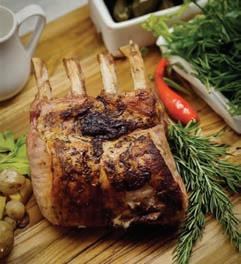
“It is important to keep in mind that consumers are increasingly seeking value, and value does not always equate to price.”
—Rikki Ingram, Tyson Foods
claims. Brands are garnering notice for their production practices, such as Austin, Texas-based Force of Nature’s regenerative meats that are billed as “climate friendly.” Meanwhile, shoppers can access more information through sources like The Good Meat Project, a Portland, Ore.-based nonprofit group that offers a directory of farms, ranches, retailers, butcher shops and restaurants that carry meats aligned with the organization’s stated values.
At Seaboard Farms, Camarin says that people appreciate learning more about agriculture, stewardship and production. “Consumers also care about the quality of products they serve their families and want to make sure that the meat they select is a healthy, wholesome source of nutrition,” she adds. “The Prairie Fresh Way is our way of doing business, founded on a connected food system that allows us to control the production process from farm to delivery, resulting in better animal health and better pork quality.”

Today’s consumers crave extraordinary eating experiences — like the world-class sophistication of Trusted Veal from Europe. Time-honored Dutch traditions create the world’s finest veal, with lofty standards that live up to the legend.
Give confident cooks an irresistible reason to keep coming back to your meat case — the continental allure of European veal.
Discover More World-Class Tastes at TrustedVeal.com
©2023 Trusted Veal from Europe. All rights reserved.

CAN CATCH THEIR SHARE OF PROTEIN SALES BY PROVIDING COOK-AT-HOME CONSUMERS WITH MORE OPTIONS, IDEAS AND
By Lynn Petrak



t’s been somewhat steady — if not quite smooth — sailing for seafood categories heading into a new year. Food retailers have opportunities across fresh, frozen and canned segments to garner more attention and sales through a diverse product assortment and ongoing education efforts about preparation and sourcing.



As with most categories, there are both headwinds and tailwinds affecting this type of protein. Inflation remains one stubborn challenge: Overall fresh seafood prices rose again in October after falling during the prior weeks, according to data from San Antonio-based 210 Analytics and Chicago-based Circana.
“While prices are looking better for the consumer, the average price per pound remained significantly higher than the average price per pound for the three biggest animal proteins of chicken ($3.09), pork ($3.15) and even beef ($6.68),” notes Anne-Marie Roerink, principal at 210 Analytics. On the plus side, she adds, four of the top five sellers in refrigerated /fresh seafood showed deflationary conditions in October.
The inflation news was better in frozen seafood, according to the October report from 210 Analytics and Circana. The average price of frozen shrimp, for instance, dipped 5.4% that month, while frozen salmon experienced a 4.2%
Although consumers continue to be motivated by price, there are some tailwinds that are favorable for growth in seafood. Chief among them is the ongoing habit of cooking at home. The 2024 “Power of Seafood” report from FMI – The Food Industry Association revealed that home-cooked seafood accounts for 59% of consumption, up 6% from 2023.
“Consumers are overwhelmingly showing preference to eating [food at home],” says Rick Stein, VP of fresh foods at Arlington, Va,-based FMI. “I think after two years of consumers reducing their purchasing of seafood at retail, they will rebound in 2025. Seafood prices have been stable now for a while, and in some cases, we are seeing slight deflation. Combine this with the desire to eat healthy and eat at home, and I believe 2025 will be a good year for seafood sales at retail.”
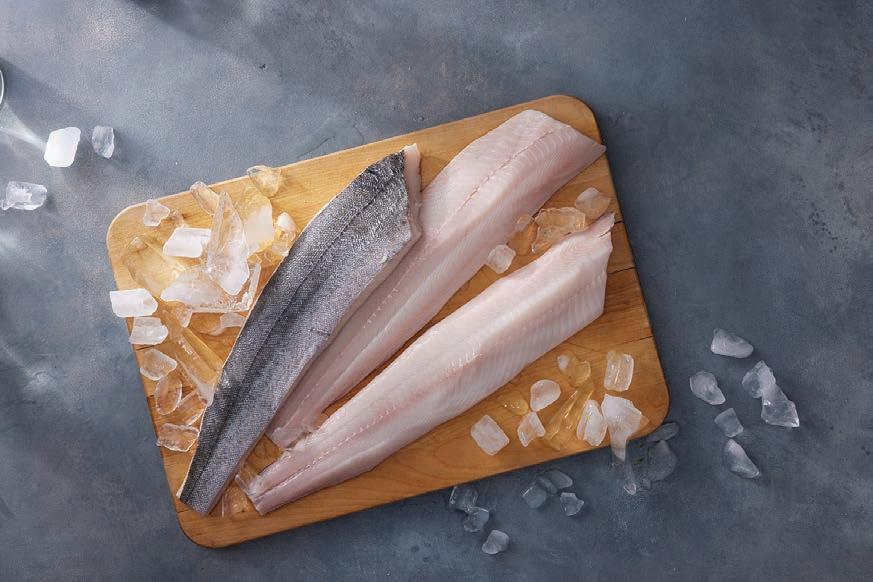
That sentiment is shared by Amy Dukes,
Food retailers have opportunities across the fresh, frozen and canned seafood segments to garner more attention and sales.
With more people preparing and cooking seafood at home, grocers can pursue strategies to keep seafood top of mind among shoppers.
In the alt seafood space, the plant-based aquatic ingredient subcategory is one to watch.
head of retail marketing at the Juneau-based Alaska Seafood Marketing Institute (ASMI). “Recent research from ASMI shows that 74% of consumers wish they ate seafood more than they do, with 66% noting that cooking guidance would help them cook it more often,” notes Dukes. “Across demographics, there is widespread acknowledgement of seafood’s nutrition benefits, with 78% of seafood consumers prioritizing health and nutrition, along with a growing desire to eat sustainably. All of this, combined with potential ongoing inflationary pressures in 2025, points to the likelihood that consumers will continue to cook more at home, and that seafood is poised to remain part of their regular at-home rotation.”
With more people preparing and cooking seafood at home, grocers can pursue strategies to keep seafood top of mind among shoppers looking for ingredient and meal solutions:
Share more recipes and suggestions. Given consumers’ propensity to cook at home — and their lack of knowledge when it comes to some seafood types — grocers can move the needle by providing recipes and cooking tips in-store and online. Stores can also tap into the expertise of their own staff, since 39% of seafood customers seek advice from the seafood counter, per the FMI study.
“Since shoppers are looking for inspiration, providing point-ofsale materials like recipes and cooking tips, as well as a knowledgeable and well-trained staff at the seafood counter, is vital for inspiring seafood consumers,” remarks Dukes.
Highlight the diversity of offerings: Shoppers may lean into familiar favorites like shrimp and seafood, but grocers can generate interest among those seeking something different. One case in point is the surge in tinned seafood sales following viral TikTok social media posts about such products in 2024. On the fresh side, seafood department associates can point to options like arctic char, swordfish steaks, or any fish caught locally or shipped fresh regularly.
Tap into demand for convenience: While retailers can provide recipes for shoppers who are cooking at home, they can also tout shortcuts for easier meal prep. Seasoned or marinated fresh seafood products are convenient, as are heat-and-serve and ready-to-eat products available in the center store and frozen department.
Add seafood promotions to the mix: Retailers have an opportunity to capture more seafood sales when market conditions improve. “As prices stabilize or even decrease, I think consumers will respond, especially to promoted items,” says Stein. “Retailers will be able to promote and still maintain their traditional promotional margins, and hence I see them getting more aggressive with promotional calendars in seafood.”
For her part, Dukes suggests promoting convenience cuts to lure shoppers. “Specials and promotions are also one of the primary purchase drivers at both retail and foodservice, and can motivate shoppers to try new types of seafood,” she explains. “This is especially effective

with value-add items like a pre-marinated miso Alaska sablefish, or using species like Alaska flounder in place of other whitefish in a seasoned fish taco mix.” In 2024, according to Dukes, ASMI worked with more than 25 national retailers to create campaigns that highlighted wild Alaska seafood, with an average sales lift of 6.1% during key timeframes like Lent.
Play to the health halo of seafood: New Year’s resolutions aside, consumers in general are looking for ways to eat healthier, and seafood is a nutrient-rich food. One recent study, published in the International Journal of Cancer, found that omega-3 fatty acids found in fatty fish like salmon could lower the risk of developing certain cancers.
“Since shoppers are looking for inspiration, providing pointof-sale materials like recipes and cooking tips, as well as a knowledgeable and well-trained sta at the seafood counter, is vital for inspiring seafood consumers.”
—Amy Dukes, ASMI
Share sourcing stories: Information-seeking shoppers may appreciate learning about the origins of seafood. For example, according to ASMI, 74% of consumers are more likely to choose seafood when they see the Alaska Seafood logo, with Millennials particularly associating it with sustainability, and 65% of consumers find “Alaska salmon” more appealing than “Atlantic salmon.”
“Consumers will of course be balancing desires to eat sustainably with factors like taste and cost, but retailers can help by clearly communicating/labeling the origin and sustainability benefi ts of seafood items,” Dukes advises.
Keep an eye on alternatives: As in other animal-based protein categories such as beef, pork and chicken, the seafood sector is complemented by seafood alternatives and plant-based proteins from water sources. In its 2025 trends forecast, Austin, Texas-based Whole Foods Market listed plant-based aquatic ingredients as a subcategory to watch. “With the continued popularity of seaweed and the increasing interest in harvesting readily available aquatic plants for more sustainable sources of protein and nutrients, the tide is turning toward foods made with more sea and freshwater greens,” the grocer’s trendspotters write, citing ingredients like sea moss used in gummies and smoothies, and duckweed.

KEY COMPANY EXECUTIVES DISCUSS THE COMPANY’S CURRENT IMPACT ON THE GROCERY BUSINESS, AS WELL AS GROWTH OPPORTUNITIES IN THE YEARS AHEAD.
By Greg Sleter
Starting as a small cooperative to deal with product shortages during World War II, Topco Associates LLC today has nearly $18.3 billion in sales and is celebrating its 80th anniversary. Founded in 1944 as Food Cooperatives Inc., the company would merge with Top Frost Foods in 1950, as the two organizations were well matched in the services that each offered to their respective members.
The merger led to a new corporate name: Topco.
Its founders likely could not envision the size and scope of the company today, along with the impact that Topco has on its members and millions of shoppers across the country. Based in Itasca, Ill., the privately held company provides aggregation, innovation and knowledge management solutions for its food industry member-owners and customers, including grocery retailers, wholesalers and foodservice companies.
Topco leverages the collective volume, knowledge and commitment of these companies to create a competitive advantage in the marketplace by reducing costs and offering winning business-building capabilities.

In this special section celebrating Topco’s 80th anniversary, Store Brands speaks with key company executives and board members who discuss the impact that Topco has on the grocery business today and the opportunities for growth in the years ahead.
Its founders likely could not envision the size and scope of the company today, along with the impact that Topco has on its members and millions of shoppers across the country.



TOPCO CEO RANDY SKODA DISCUSSES THE COMPANY’S EVOLUTION AND THE ROLE IT PLAYS IN HELPING REGIONAL GROCERS STAY COMPETITIVE.
By Greg Sleter
For the past 80 years, Topco has been serving the needs of regional grocers and their customers by allowing smaller chains to remain competitive in the face of growing competition from national powerhouses.
Today, the grocery cooperative is an $18.3 billion privately held company that touts itself as providing aggregation innovation and knowledge management solutions to its members, which include grocery retailers, wholesalers and foodservice companies. Topco can leverage the collective volume, knowledge and commitment of these companies to create a competitive advantage in the marketplace by reducing costs and offering winning business-building capabilities.
A big change in the company happened nearly a decade ago, when Topco launched its commitment initiative. By having members commit to buying certain levels of products from Topco, the company was able to work with product suppliers to obtain better pricing on a host of items.
As Topco celebrates its 80th anniversary, its president and CEO, Randy Skoda, spoke about the company’s evolution and the growth opportunities that lie ahead.
Store Brands: As Topco turns 80, can you give us an overview of the company?
Randy Skoda: Topco has talked a lot about commitment. As we celebrate our 80th year, it’s important to understand how Topco operated for its first 70 years. We were strictly a voluntary cooperative, which meant that a grocery could buy whatever they wanted from us one day, and then the next day buy something different, or buy direct. Operating as a voluntary co-op, we had to sell each member individually and were not able to go to market as one. Topco for years was going to market with a lot of scale, but individual members make their own decisions about products and all have different specs.While we still serve voluntary members, the real benefits are for those members who have committed to Topco. The committed members say they are going to buy 95% of their store brands through Topco. This allows us to make decisions about products and have the power of the purchase order. That has been a game-changer, as we’ve become a much more strategic customer to our suppliers.
SB: The move toward having members commit, is that the main reason sales have jumped as high as they have in recent years?
RS: Those Topco-committed members have grown their volume through Topco by more than $8 billion. They saw value in pushing more chips to the middle of the table and allowing Topco to go to market on their behalf. But it’s a unique organization in that they partner together and leverage Topco to work on their behalf. I think many of our members would tell you they would not be around as regional retailers if they didn’t partner with each other. At the end of the day, Topco is a platform that is jointly owned by these retailers and wholesalers where they decide to partner together and execute through our platform.
SB: Are there certain members that drive a large percentage of Topco’s business?
RS: Our top 20 members account for a little less than 80% of our volume. We have 46 members in total currently, and 35 of those members are committed. Those committed members represent 91% of our business.
SB: How do you get the noncommitted members to change and become committed?
RS: The decision to become a committed member of Topco comes from the very senior level of each member. What happened over the years is there’s turnover in senior management. When a new CEO comes in, they may have never heard of Topco or understand why they need us. It’s an educational process. We have had instances where we have spoken with the new CEO, and once there was an understanding of our role, the CEO doubled down on our relationship with the given member. And when inflation hit the industry, we had some large voluntary members reach out to have deep discussions to find out what they were missing.
Quite frankly, the economy served to drive members who weren’t heavily engaged with us to become more engaged because they needed to find new ways to survive. We also get a greater benefit by bringing more scale to the organization. Even if our members have stores across the street from each other, they
Even if our members have stores across the street from each other, they understand that by growing the co-op, they’re all going to win.
—Randy Skoda, Topco President and CEO
















understand that by growing the co-op, they’re all going to win.
SB: It’s an interesting dynamic, since you could have members in one room who are also competitors, but it seems to work without any problem.
RS: We do take the competitive overlap very seriously in the sense of making sure we’re not discussing things that would run afoul of antitrust rules or anything else. When we’re sharing things in a group setting, we’ll separate our members by regions so there’s no overlap in conversations and our members can be confident that they are sharing information with others who are noncompetitive. And you’re right in that we’ll have people sitting side by side carrying the same brands, but they have realized that the guy across the street is not the real competitor. The real competitors are Walmart, Kroger and Amazon. You know, if you think about Amazon, they are taking volume out of every one of these markets. The products just show up at someone’s house.
SB: With members across the country, how challenging is it to develop private label products that meet the needs of customers at each of those retailers?
RS: We have an incredibly strong insights team that uses national insights and regional insights to identify opportunities. We work to tap into emerging trends and make products available


















to all our members. But we also know the West Coast is different from the Midwest or East Coast. Our team does a really good job of developing products that target specific regions. We’re fortunate to have a diverse membership that allows us to do different things. We also represent store brands when talking to the category manager.
SB: When you look toward the future, where are the growth opportunities for Topco?
RS: One of the growth opportunities we have is how we do more with our existing members. National brands are one opportunity. While we’re doing some pilot programs, we buy next to nothing as it relates to national brands. If we could buy those products on behalf of our members, Topco could almost double our business without having to come up with one new product. We also see foodservice as a big opportunity. Not only can we supply deli products and food such as chicken, but we can also supply the cooking oil needed by foodservice operations to prepare the food. When you look at most retailers, their foodservice and retail operations are completely different and they don’t buy their commodities together inside the store. For example, the retail side buys sugar and the foodservice side buys bulk sugar, but they don’t work to buy all that sugar together. We’re working through some of those things, and we think there’s big scale there.

























By Greg Sleter
Consumers today are focused on finding quality products at a strong value, and many have turned to retail private brands to meet this growing need.
Recognizing the opportunity to expand its own-brand product lines, Topco is in a unique position to help its 46 retail members provide their shoppers with storewide money-saving solutions that also offer quality and uniqueness.
Katie Waeltz, VP of center store category management and insights with Topco, shared her insight on the changing


private label marketplace and how Topco has evolved its efforts to meet the needs of consumers.
Store Brands: What is the current state of Topco’s private label business?
Katie Waeltz: There has been an elevated and added consumer appreciation for own brands. The days of a white box and a black label are gone, and own brands stand for value and quality. These are brands that have meaning and have a connection to shoppers, but it’s been a journey. The pandemic stressed the supply chain everywhere, and it provided an opportunity for own brands to shine with shoppers who perhaps in the past would never consider them.
Coming out of the pandemic, shoppers were presented with high inflation, and there was this push-pull between national brands and own brands. At Topco, we have been able to navigate those challenges and changes, and it has evolved the way we understand shopper behavior and the solutions we provide to our membership, enabling them to be competitive in the future.
SB: What steps can Topco take to compete with the ways national brands can push back to regain some of the shelf space they have lost to own brands?










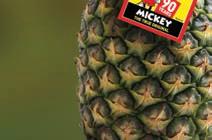






















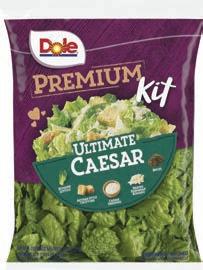






KW: First and foremost, we compete by partnering together and aggregating to ensure that Topco members have high-quality solutions for their shoppers every day. Our sourcing teams are relentless in their pursuit of the best cost and are keenly aware of the commodity triggers that can bring cost down — and they champion those every day. We continue to innovate with new items, brands and solutions, of course, and we’re consistently recognized in the industry for excellence in innovation and design.
We also innovate in redefining solutions that we have provided to shoppers for years. We’ve been able to reposition our packaging to be more relevant to shoppers, focusing on the elements they value and highlighting those for easier decision-making at shelf.
Also, coming out of the pandemic, suppliers were hesitant to do shippers and displays — labor is expensive, and carrying inventory on displays can be challenging. So we shifted gears to say we still need these things, but not every day — some shippers and displays can be featured during key selling seasons only.
SB: As consumers continue to increase the amount of private label products they purchase, what is driving the movement? Is it still economics, or are there other factors at play?

KW: There is still the shopper that has a certain dollar amount in their pocket and at any given time is making trade-offs at the shelf every day. Own-brand products can serve their needs. There is also a segment of customers that have become increasingly loyal and fanatical about the own brands they buy. They trust these brands for their families, and they have a deeper connection to the brand — in own brands, that’s often a balance between value and quality: Not only is it a good value, but I also trust the brand to deliver for me and my family.
SB: Have there been any noticeable changes in terms of demographics with who is buying private label products?
KW: Private brands have become more ubiquitous, so everyone is buying products sold under private brands for different reasons. What’s becoming more interesting is how you appeal to certain groups of shoppers. Take Gen Z, for example. They’re digital natives, they often build brand trust through influencers, they’re the most ethnically diverse generation, and they seek authenticity. What surprised me about Gen Z is they’re still making a lot of decisions in-store, at the shelf and based on some of the key factors that many generations before them did. So, while they are different, there are some key principles that remain consistent for them.














































Private brands have become more ubiquitous, so everyone is buying products sold under private brands for different reasons and to meet different needs. What’s becoming more interesting is how you appeal to certain groups of shoppers.
—Katie Waeltz, Topco VP of Center Store Category Management and Insights


SB: Topco currently has 46 members. What type of feedback or input do you receive from members in terms of developing new products or cycling out of other products?

independent retailers, and the most challenging thing about being a co-op is that we have 46 members with different strategies.” Our most successful strategy has been our ability to secure commitments from our retail members upfront. We also use qualitative and quantitative research with their shoppers. We seek to understand our members’ shoppers and what they are seeking from their grocery store. This supports the development of new brand strategies and new items. When we have concepts for new products, we communicate with members to garner interest in what we are proposing.
in what we are proposing.
SB: As you look ahead, what are the opportunities for growth?





KW: Randy Skoda, our CEO, says this all the time: “The best thing about Topco, and our biggest strength, is that we have 46

If we could get all of our members to commit and partner together on key initiatives, I think we would be unstoppable. Our members know their communities better than anyone in the industry and are a force to be reckoned with. I look forward to continued growth in member brands, Topco brands and innovating.


















THE 2024 TOP WOMEN IN STORE BRANDS HONOREES EACH OFFER UNIQUE SKILL SETS THAT ARE HELPING DRIVE BUSINESS.
By Greg Sleter
For more than a decade, Store Brands and Women Impacting Storebrand Excellence (WISE) have teamed to honor women across the private label industry who have had and continue to have a major impact in the store brand segment.
From supply chain to sales, marketing, finance and more, members of the Top Women In Store Brands (TWISB) Class of 2024 play vital roles in moving store brands forward amid new and ongoing challenges that include rising prices, capacity issues with manufacturers, and evolving demand from consumers. Meet this year’s TWISB honorees.

Paula Klassen TreeHouse Foods, Oak Brook, Ill. Lifetime Achievement Award
For nearly 18 years, Klassen has played a pivotal role in ensuring the highest standards of safety and quality at TreeHouse Foods. First joining the private label product supplier in 2007 as director of food safety and quality assurance, Klassen is now VP of food safety and quality at TreeHouse. The 2024 TWISB Lifetime Achievement honoree is responsible for building capabilities with her team and across the company’s operations.
Over the past year, Klassen has implemented advanced systems and statistical process controls that have signi cantly reduced quality incidents and consumer complaints. Her focus on predictive quality management has empowered operators to make timely adjustments, ensuring that TreeHouse continues to deliver safe, high-quality products to its customers. She also spends much of her time at TreeHouse’s manufacturing facilities, coaching site leaders and hourly employees to embrace a culture of quality.
In addition to her internal contributions, Klassen has partnered with regulatory agencies to ensure that TreeHouse consistently meets or exceeds regulatory requirements. Her dedication to continuous improvement and excellence has strengthened TreeHouse’s reputation in the industry as a trusted provider of safe, high-quality private label products.



Gaudette Daymon, Stamford, Conn. Corporate Services Award
At the start of 2024, Gaudette was named Daymon’s director of process and technology, re ecting her work spearheading the use of technology to streamline processes. That work was also a key factor in Gaudette’s being named a 2024 TWISB honoree in the Corporate Services category.
Over a 12-month period, Gaudette successfully relaunched PLM Connect, a private label management tool that has streamlined project work ows for three major retail clients and Daymon’s internal teams. With this tool in place, Daymon’s customers have reported a 30%-40% reduction in project hours and an eye-catching 91% on-time project launch rate.
Additionally, Gaudette developed and introduced Transformative Process Solutions, a service designed to streamline and optimize processes within private brands. This service gained international adoption within six months, highlighting Gaudette’s keen understanding of industry needs and her ability to lead successful service launches.
Through her leadership, Gaudette is demonstrating that one can have a successful career within the private label industry beyond sales, marketing, product development and the supply chain.

Over the past four years, Do, business manager at o , has made meaningful contributions to the global store-brand industry, particularly in the U.S. market. Her leadership and expertise have been pivotal in the company’s spice sector, earning her this year’s TWISB Emerging Leader Award.
Do leads the execution of products grown, produced and packaged in Vietnam for sale in the United States. Black pepper, a key product, is a prime example of her successful work in overseeing the entire production journey, from farm to shelf. Her responsibilities include managing a team in Vietnam and collaborating with the U.S. sales team.
One of her notable accomplishments was transitioning the production of black pepper tins from the United States to Vietnam, streamlining operations and ensuring that all U.S. retailer packaging and regulatory requirements are met.
Do’s leadership has also contributed to record growth in store-brand spices in the United States. Under her guidance, o ’s store-brand black pepper achieved a higher dollar and volume share than a well-known national brand, boosting sales and pro tability for U.S. retailers. Do’s ability to replicate this success with other Vietnam-grown spices, including cinnamon, has further solidi ed her in uence in the store-brand sector.






























• Full range of ultra, premium, FSC® Certified, recycled, and traditional paper grades.
• Paper towels, bath tissue, napkins, and facial tissues.


• Flexible, custom manufacturing, packaging and displays.
Some things simply go together - for good reason. By delivering quality private label paper products, at the best price, when and where they’re needed, our customers confidently trust us with their label. Just ask and we’ll put it on paper!


• For lower volumes, we offer our pre-packaged Azure® Ultra Premium, Daisy®, Delicate Touch®, and Earth One™ store brands.

































Rachel Bukowski
Whole Foods Market, Austin, Texas Innovation Award
During her eight years at Whole Foods Market, Bukowski has held several roles on the grocer’s product development team, but it’s her success in her current role as director of research and development that has earned her the 2024 TWISB Innovation Award.
In leading the grocer’s exclusive brands research and development team, Bukowski has cultivated an environment of innovation, contributing signi cantly to the success and growth of Whole Foods’ private label offerings.
One of Bukowski’s key accomplishments over the past year was spearheading the seventh annual “Macro Trends” report and the Macro Trends Showcase. This event involved hundreds of Whole Foods and Amazon team members in the innovation process, highlighting Bukowski’s ability to foster collaboration and thought leadership within the wider organization.
Bukowski’s impact goes beyond innovation, however. She led a data-driven approach to ensure existing products meet customer expectations through Whole Foods’ sensory and product quality teams. This effort elevated product quality and resulted in numerous successful new launches, including a marinated-meat program that saw double-digit growth in both sales and units.

Lauren Schmitter Paramount Coffee, Lansing, Mich. Regulatory/QA/ Safety
Schmitter’s journey at Paramount Coffee began ve years ago as an intern while attending Michigan State University. After graduation, she rose to an important role within the company’s quality department, and is now the SQF (Safe Quality Food) practitioner.
The 2024 TWISB Regulatory/QA/Safety Award honoree, Schmitter oversees the development, implementation and maintenance of Paramount’s SQF Quality System. This involves ensuring compliance with the SQF Code, supervising the quality control team, and continuously re ning training and auditing processes to maintain the highest safety and quality standards.
Schmitter has overseen signi cant projects at Paramount. She ensured that food safety and quality were maintained during the installation of two new pieces of equipment — a roaster and a mixer — and during the recovery from a roaster malfunction. These large-scale projects could have disrupted operations, but her attention to detail helped maintain a awless process.
Schmitter’s leadership extends beyond her day-to-day responsibilities. She chairs multiple committees within Paramount, including food safety, environmental health and safety, HACCP, and diversity, equity and inclusion. Her in uence is widely respected, not just among her immediate team, but also across the entire production plant.

While Hatziyannis has been with Sprouts Farmers Market for less than two years, she’s no stranger to the private label industry, having worked for various CPGs and at leading grocers. In her current role as category strategy manager at Sprouts, Hatziyannis is a pivotal gure in developing innovative products that drive growth and consumer loyalty.
Her role focuses on managing Sprouts’ private label products in both the bulk and frozen categories. Since joining the company in May 2023, she has leveraged her extensive background in food science and manufacturing to deliver category strategies that keep Sprouts on the cutting edge. Her ability to monitor, maintain and optimize retail execution has been instrumental in expanding the store’s private label offerings. These factors, among others, are why Hatziyannis has been named a 2024 TWISB honoree in the Marketing and Merchandising category.
By using market data and consumer insights, Hatziyannis creates solutions that address unmet consumer needs, translating them into distinctive products. She also plays a critical role in vendor selection and negotiations, strengthening relationships with cross-functional teams and with Sprouts’ co-manufacturing network.

Over the past decade, Tierney, retail sales manager at Catania Oils, has rmly established herself as a dynamic leader in the private label industry. Working for one of the largest oil-processing facilities in the United States, Tierney has demonstrated an ability to grow and diversify Catania’s client portfolio while ensuring top-tier service and innovative solutions for her customers, leading to her selection as the 2024 TWISB Sales Award honoree.
A big part of Tierney’s success is her ability to broaden relationships with existing clients, ranging from national and regional grocers to discount chains, while also working with expanding discount grocers and specialty retailers focused on providing shoppers with unique products.
Tierney has leveraged her expertise in marketing and time management to execute successful sales and marketing campaigns that have secured new business and expanded Catania’s market share. Notably, she secured a new SKU for Whole Foods Market, a client that Catania had pursued for years, and expanded business with distributor KeHE by adding a foodservice SKU alongside retail offerings.
Further, her strategic initiative of selling oil totes to brokers that repack them for Whole Foods showcases her innovative problem-solving skills, directly contributing to Catania’s success.

Karen Swartzentruber
Winland Foods, Oak Brook, Ill. Operations Award
Swartzentruber, this year’s recipient of the TWISB Operations Award, oversees a team of 25 employees at Winland Foods, guiding them through the complexities of daily production. Her expertise in SAP systems has made her an invaluable asset to the company, and she frequently steps in to support the production manager when needed. Her technical pro ciency, combined with her ability to inspire and lead her team, has contributed signi cantly to the plant’s overall success.
One of Swartzentruber’s most notable achievements this past year was leading an AM/PM project aimed at optimizing production and achieving record numbers. This initiative not only boosted the team’s performance, but also enhanced service levels, directly bene ting Winland’s customers and positioning the plant for continued growth.
Her leadership style is de ned by fairness, encouragement and a strong commitment to helping others advance within the company. She takes pride in mentoring her team members, ensuring that those who wish to grow within the organization have the support and guidance they need to succeed.

Julie McGuire
FedUp Foods, Marshall, N.C. Supply Chain/ Procurement Award
The use of innovative sourcing strategies while maintaining a commitment to sustainability has been key to McGuire’s success as strategic sourcing specialist at FedUp Foods.
McGuire has been integral in establishing FedUp as the largest private label fermented-beverage manufacturer in North America. Specializing in kombucha, prebiotic sodas, tepache and cold-brew coffee, the company operates with a mission of environmental and social impact, values that McGuire, the 2024 TWISB Supply Chain/Procurement Award honoree, champions daily.
Her responsibilities at FedUp revolve around balancing quality, cost and resilience in the procurement process. Over the past year, her leadership was pivotal in organizing the rst FedUp Foods Summit, which brought together suppliers to explore regenerative practices in the beverage industry. McGuire’s ability to foster deep relationships and initiate collaborative discussions with these partners has laid the groundwork for a more sustainable supply chain.
McGuire also implemented a dual-sourcing strategy that has bolstered the company’s supply chain, securing reliable ingredient sourcing from multiple suppliers while maintaining rigorous quality standards.

GROCERS AND SOLUTION PROVIDERS PUT THE FOCUS ON CUSTOMER EXPERIENCE, ASSOCIATE SUCCESS, AND MORE. By
Emily Crowe
echnology-led transformation is afoot at food retail, from robots roaming the aisles to provide real-time shelf intelligence, to handheld devices that help associates do their jobs better. Not only is technology becoming more physically present in supermarkets, but it’s also creating more relevant experiences for shoppers both in-store and online.
As we look toward the new year and beyond, here are a few of the most important technology innovations poised to turn the tide in the grocery industry.
Not only is technology becoming more physically present in supermarkets, but it’s also creating more relevant experiences for shoppers both in-store and online.
G rocers are increasingly moving AI, computer vision and other technology directly to the aisle to keep tabs on inventory.
Associate engagement, retail media, audio, customer experience and loyalty are other important areas for technological advancement at food retail.









With Toshiba, every choice you make becomes a gateway to new opportunities. Empower your retail journey with personalized experiences, sustainable growth, and operational excellence.
Together, let’s shape a future where every choice leads to endless possibilities.































he started 17 years ago to empower retailers through advanced data feed solutions. With a degree in computer engineering, he wrote much of the early code and grew VersaFeed into an engineering-first company.
Using real-time data feeds, grocers can leverage Google’s local ad formats to promote in-store inventory and pricing, driving both foot traffic and regional delivery sales. Progressive Grocer sat down with VersaFeed CEO John Kleven to explore how these tools help grocers stay competitive in today’s market.
Progressive Grocer (PG): What are product feeds, and why should grocers care?
John Kleven (JK): Product feeds enable grocers to list their entire inventory on platforms like Google, Bing, Facebook, and even Pinterest. When customers search for certain products and are near a grocer’s physical stores or within their delivery radius, they’ll see ads for these exact products with real-time prices, availability, and images. This means grocers can effectively target local and regional shoppers whether they’re looking to pick up in-store or have groceries delivered.
PG: Don’t most grocers already do this?
JK: Surprisingly, while many grocers have adopted these ad formats, many are still doing it poorly. They might only list part of their product catalog, provide inaccurate information, or fail to update things like sale prices and promotions frequently enough.
PG: What do these ads look like, and why are they so effective?
JK: Let’s talk about Google, where these ads really shine. The ads are highly targeted and only appear when a shopper searches for a specific product that’s in stock. Google offers two main ad formats:
• Local Inventory Ads (LIA): LIA targets shoppers near your store, displaying the exact product they searched for, along with the image, title, price, and how far away your store is. The goal is to get the shopper to visit and buy in person.
• Regional Availability and Pricing Ads (RAAP): RAAP ads target shoppers within a delivery area (like zip codes). Similar to LIA, RAAP ads show the exact product and price but focus on delivery options rather than in-store pickup.
Both formats ensure shoppers find the exact product they’re looking for, making these ads highly effective.
PG: What does VersaFeed do to make this happen for grocers?
JK: Creating the data feeds that power these ads is complex, especially with grocers who have intricate systems for managing inventory and pricing. VersaFeed handles all of this: we work with grocers’ tech teams, write custom code, and build these feeds daily to reflect up-to-the-minute prices, availability, and promotions. Once the feed is ready, it’s sent to Google (and other platforms) to make sure products are always visible.
PG: Which platforms support these types of ads?
JK: Google is the clear leader in this space, but Meta (Facebook) and Bing also offer similar products. We’ve even developed creative ways to run comparable ads on platforms like Pinterest, Snapchat, and TikTok, even though they don’t officially support these types of ads. The beauty of VersaFeed is that once we’re receiving your inventory data, we can easily broadcast it across all these channels.
PG: How can grocers get started?
JK: The first step is a free feed audit from our team. We’ll assess the current setup at no cost and provide recommendations. For retailers that are not yet listing on these channels, we’ll provide information on the easiest way to get started. If grocers are already live, VersaFeed ensures they are fully making use of both LIA and RAAP ads, promotions, hourly pricing updates, and additional channels.


Grocers are increasingly moving artifi cial intelligence (AI), computer vision and other technology directly to the aisle to keep tabs on inventory, in an effort to boost availability, right-size order quantities, reduce waste, and more. Aisle-roaming robots from San Francisco-based Simbe and San Diego-based Brain Corp. are giving grocers a real-time view of shelf conditions so they can quickly and effi ciently deal with out-of-stocks, and Simbe is taking its shelf intelligence one step further with the new Simbe Brand Insights solution.


Simbe Brand Insights can equip retailers’ vendor partners, including direct store delivery (DSD) partners, CPG brands, national-brand manufacturers, and smaller brands, with near real-time shelf intelligence and insights on SKU-level shelf availability and out-of-stocks, precise item location, restocking and promotion execution, and more. According to Simbe, vendors can use that data to help improve inventory, product placement, pricing, shelf share and the overall customer experience.

“For years, our retail partners have run their businesses with Simbe’s platform’s item-level data, and it’s become clear that this information also has immense value beyond store walls,” says Brad Bogolea, Simbe’s co-founder and CEO. “By sharing store intelligence with vendors, Simbe Brand Insights puts the retail ecosystem on the same side of the table, leading to stronger relationships and performance across the board.”
Autonomous robots use AI and computer vision to keep an eye on stock levels and to help make associates' jobs easier.




Automated shelf monitoring and gap scanning from VusionGroup’s Captana platform, meanwhile, offer daily reports to grocers to help them streamline operations and reduce inventory management ineffi ciencies. The French company’s solution can help improve product assortment planning and replenishment while also enabling grocers to keep the products their customers want available in-store and to offer relevant promotions.
In today’s challenging job market, it’s becoming more imperative to keep associates appropriately engaged and give them the right tools to help them do their jobs better. Target’s recently launched generative AI-powered chatbot, for example, answers on-the-job process questions, provides coaching and training, and supports store operations.
“We know technology will continue to play an outsized role in the future of retail — for our team members, our guests and our business,” says Brett Craig, EVP and CIO at Minneapolis-based Target. “With that in mind, we’re continually experimenting with new tools to make it even easier for our team to do their jobs and to bring more of what guests love about shopping at Target to life. The transformative nature of GenAI is helping us accelerate the rate of innovation across our operations, and we’re excited about the role these new tools and applications will play in driving growth.”
Further, Bentonville, Ark.based Sam’s Club is employing AI- and computer vision-pow-
“The transformative nature of GenAI is helping us accelerate the rate of innovation across our operations.”
—Brett Craig, Target Corp.

ered task automation that allows employees to spend more time serving customers. Chris Nicholas, the company’s president and CEO, spoke at this year’s Groceryshop conference about how Sam’s Club focuses on people-led technology instead of trying to make technology fit into the company’s operations for its own sake.
According to Nicholas, the retailer now employs a system that takes more than 23 million images a day of where all of the inventory is in a club, and then connects to an associate’s personalized device to tell them what their next task is. This year alone, the system will help take 100 million mundane tasks off employees’ shoulders.
“The reason that’s important is, I won’t have fewer associates, but now those associates can spend time connecting with members,” Nicholas explained. “They can help them connect on being digitally engaged, they can help them connect with the services that we’re creating. They can help do the work of e-commerce.”
Retail media is a given differentiator in today’s grocery landscape, and it’s entering a new era of efficiency, thanks to AI and automation. Boise, Idaho-based Albertsons Media Collective, for example, has partnered with Capgemini, a French IT services provider and consultantcy with offices in New York, to streamline its back-end quality assurance process, and will eventually use this technology to help generate creative assets for its campaigns.
“For us right now, the way that we’re applying the
AI is through the learning models, so it is more of a learning assistant to find those either repeatable errors in creative, or repeatable processes within media,” explains Albertsons Media Collective Head of Media, Creative and Operations Michelle Weiskittel. “So, it speeds that basic media- planning process up, and that’s really where we’re focusing on our AI, is more productivity and learning to help them [with] those productivity gains.”
Audio is also poised to become another key aspect of retail media success. AD Retail Media, the advertising arm of Ahold Delhaize USA, has partnered with Fishers, Ind.-based Vibenomics to offer CPG suppliers enhanced audio solutions to help them engage customers through personalized, real-time messaging that can be customized based on product type, daypart, demographic, and more.
“Shoppers have become more discerning, with expectations for convenience, personalization and seamless interactions across every touchpoint. Grocers must adapt to these evolving needs to build customer loyalty and drive long-term success.”
—Fredrik Carlegren, Toshiba Global Commerce Solutions
Spots play two times per hour within Ahold Delhaize USA stores, including Food Lion, Giant Food, The Giant Co., and Stop & Shop. “Enhanced audio provides even more opportunity for our partners to inspire customers during their shop,” says Bobby Watts, SVP, AD Retail Media. “They also provide increased agility for our partners, because of the speed to market. Through these channels, our partners can respond instantly to what customers are experiencing.”
A superior customer experience is clearly table stakes now and in the future to stay competitive in the industry. “Shoppers have become more discerning, with expectations for convenience, personalization and seamless interactions across every touchpoint,” says Fredrik Carlegren, VP and head of marketing and communications at Durham, N.C.-based Toshiba Global Commerce Solutions. “Grocers must adapt to these evolving needs to build customer loyalty and drive long-term success.”

According to Carlegren, grocers must stop treating online and in-store shoppers as separate segments and embrace a holistic approach to doing so by leveraging technology and data insights to better understand customer behavior, preferences and shopping patterns.
“Grocers can create more targeted promotions, optimize product recommendations and deliver personalized communications that drive deeper engagement by tapping into these insights,” he says.
Eliminating friction for both shoppers and manufacturers will also be key to customer experience success in coming years, Luke Beatty, SVP, digital commerce at Jacksonville, Fla.-based Acosta Group, tells Progressive Grocer. Put simply: “Make it easy. Make it convenient and just eliminate the friction. You have to eliminate the friction, especially if it’s a digital shopper.”
Continues Beatty: “We know that people are using their mobile device in-store to aid in their shopping purchases, and they have different motivations for that. Push and partner with the manufacturers to make it frictionless for them to help activate against your vision.”
Harnessing loyalty is an important component of creating a great customer experience, especially as today’s shoppers bounce around among stores during their shopping journeys. Cincinnati-based Kroger and other retailers are offering new benefits for loyalty members, such as access to certain streaming services, and St. Ann, Mo.-based Save A Lot just rolled out its first-ever loyalty program.
“To keep shoppers engaged, grocery stores must be able to adapt quickly to changing customer behaviors and preferences,” Toshiba’s Carlegren explains. The company’s ELERA Marketing Suite helps push loyalty beyond traditional promotions as it assists in creating a cohesive and frictionless shopping journey that keeps customers coming back.
The multichannel enterprise solution enables grocers to deploy a wide range of tailored offers and personalized promotions across various touchpoints to assist in delivering cohesive, meaningful interactions while also centralizing promotion management.
By Barbara Sax

tore fixtures are an essential component of any dynamic in-store environment. From reinforcing brand identity to highlighting specific merchandise, fixturing is a critical element of store design, and the latest innovations are making a big impact on the supermarkets of the future.
In a quickly evolving marketplace, retailers are increasingly depending on modular store fixtures to allow them to respond to shifts in customer preferences, seasonal trends and inventory changes. “Modular fixturing is on the rise in the domestic and European grocery sectors,” affirms Steven D uffy, SVP of design at Cuhaci Peterson, a Maitland, Fla.-based commercial design firm. Duffy notes that modular fixtures are particularly popular in the produce department, where sectional fixtures and orchard bins are frequently used.
“Flexibility with produce fixturing is crucial for maximizing sales and ensuring that the product offering remains relevant to customer demands, seasonality and trends,” observes Jeff Cady, VP, produce and floral for Schenectady, N.Y.-based Northeast Shared Services, the main operating company of Tops Markets LLC and Price Chopper/Market 32. “The ability to quickly adjust or modify displays based on changing inventory, promotions or shifts in consumer preferences can make a significant difference in how well the produce department performs, from both a sales volume and shrink perspective.”
Tops uses mobile display vehicles for cut fruit in the summer, when the demand for fresh, ready-to-eat fruit is high. As the seasons change, Cady explains that those same cases “can be adapted to promote other items like seasonal produce, pre-packaged salads and even entire store meal solutions in the fall and winter.”

Display bins that can be easily repositioned or expanded to hold different sizes or quantities of produce are also used in Tops stores. “During the peak of summer, bins can be used for faster-moving seasonal items like melons or stone fruits, but in the fall, they can be scaled down and repositioned to focus on squash, apples or potatoes,” says Cady.
In the bakery department, Tops uses tables equipped with “drawers” on four sides. “This allows us to flex for the business, since the shelves expand the display space for holidays and Bills games and can be pushed in when not needed so we are not overexposed,” explains Karri Zwirlein, director of bakery, deli and prepared foods at Williamsville, N.Y.-based Tops.
Flexibility in fixturing is key to maximizing sales and ensuring that the product offering remains relevant to customer demands, seasonality and trends.
Cuhaci Peterson created modular orchard bins for one retailer to help maximize the display of in-season produce.
Mobile, modular fixtures are also essential for retail grocers catering to a customer base that expands and contracts with tourist seasons, and to promote greater shopper engagement. Additionally, t echnology advances and sustainability considerations are helping to shape fixturing design.

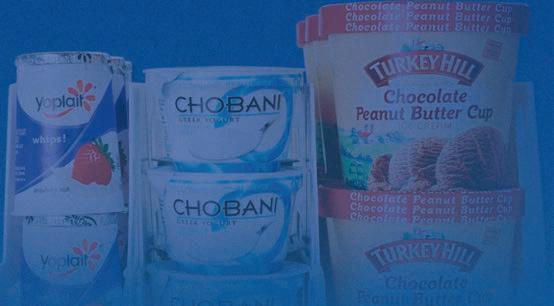


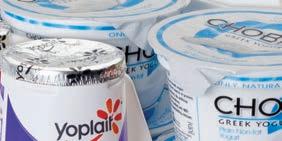
















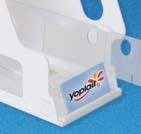




















Designed for yogurts; dips; spreads; puddings, gelatins and snacks; ice cream and sherbet; instant soup cups; microwave single-serves; food-to-go offerings, tubs, bottles and other difficult to organize products.
■ Small AMT adjusts from 2 11/16" to 3 5/16" wide for 4-6 ounce yogurt cups and similar small products.
■ Medium AMT adjusts from 3 5/16" to 3 15/16" wide for 5-6 ounce greek yogurt cups and mid-range offerings.
■ Large AMT adjusts from 4" to 4 5/8" wide for tub, pint, 11/2 pint, ice cream and large containers.
■ Width adjusts in 1/8" increments and locks in place. Two breakaways allow easy adjustment in the field from standard 22" length to 20" and 18."
■ Built-in manual feed allows trouble-free forwarding and facing of products for increased sales and profits.
■ Trays lift out for rear restocking and proper rotation.
■ Durable, easy-clean plastic construction for long-life, even under heavy use and in harsh environments.
■ Optional plain-paper label, sign and flag holder provides a protected home for product and price information and improves promotional opportunities.



Dan Phillips, owner of Langley, Wash.-based Food Market Designs, notes that flexibility is essential for his independent grocer clients catering to a customer base that expands and contracts with tourist seasons.
“Many of those stores do a big seasonal business, so they aren’t as busy in the winter months,” says Phillips. Those stores in particular need fixturing that’s flexible enough to handle seasonal crowds yet can be modified when the customer population shrinks. Stores that depend on showcasing local produce benefit significantly from modular fixturing such as orchard bins on casters, spillover bins and Euro tables. “Those are elements that can be moved around on the inside and also the outside of the store,” adds Phillips. “They can also be removed and stored when they aren’t needed. The last thing you ever want in a grocery retail format is an empty table.”
Modular fixturing additionally allows supermarkets to swiftly adapt to seasonal changes in merchandising. “Most supermarkets use quickly adaptable gondola shelving they can adjust so seasonal merchandise [can] be displayed,” says Sean Unsell, associate principal and co-leader of grocery practice at Houston-based RDC Architects. He notes that produce bin shelving can also be quickly reset to allow for seasonal products such as pumpkins or Hatch chiles.
To keep customers engaged and encourage exploration of the store, retailers are discovering the value of dynamic store layouts that can be modified frequently.
“Retailers want to set up different experiences within stores, such as a tasting area or a pop-up store within a store, whatever it might be to keep shoppers in the store longer,” asserts Kevin Kohler, VP, retail marketing solutions at Atlanta-based design agency Miller Zell.
“Grocers want to get new formats up and running and the store refreshed faster at the same time they are trying to minimize construction costs,” he adds. “We’re
working with a grocery client on an installation process of rails and elements that are not attached to walls and features signage that can easily be switched out. This fixturing allows retailers to create different layouts within the store environment without having to do construction.”
With a totally modular environment, it becomes much simpler for a retailer to segment off one section to create a specific department, according to Kohler. Stores can expand or retract the space as needed. For example, Phillips created mobile checkstands for one grocery client that can be moved away from the front of the store in the off-season to make room for a coffee area in which locals can relax with a hot beverage near the store’s fireplace.
Kohler predicts that the pharmacy department will see some fixturing changes as supermarkets reimagine how the department fits within the store. Rather than placing the pharmacy at the side of the store, he suggests experimenting with the pharmacy at the center of the store, noting, “It would be a more holistic experience where the section ties into other departments.”
Retailers are also ramping up investment in smart shelving, which uses a combination of technology (sensors, digital shelf labels, cameras and more) to automatically track inventory as well as to deliver personalized advertisements to consumers as they shop the store aisles and to collect shopper pattern insights. While balancing privacy concerns continues to be a challenge in this area, the benefits of the ability to amass shopper behavior data is a huge draw.
Smart shelving is still in the testing stage for most chains (Kroger has begun testing a solution with Microsoft that stores and processes volumes of data generated by customer actions on and around the shelves), but adoption is likely to increase. This is just the start of how AI-driven shopper data could drive fixturing design in the future. “Ongoing shopper data can help dictate gondola shelf height, which products should be on that shelf, even potentially product size,” says Kohler. “That could even tie into store layout.”

“The last thing you ever want in a grocery retail format is an empty table.”
—Dan Phillips, Food Market Designs
Sustainability considerations are also influencing the design of fixtures. As the use of hydrofluorocarbon (HFC) refrigerants is being phased out, Duffy notes that “grocers are working toward updating store systems and equipment.”
“We are thrilled with some of the innovations our clients are embracing with new refrigerated cases and systems,” says Unsell, whose firm works with ALDI, recently recognized by the EPA for its leadership in reducing refrigerant emissions.

Showcase your pizzas like never before with NEXT PRO™ PizzaRack™
Gone are the days of burying your pizzas in flat, hard-to-see stacks. With NEXT PRO PizzaRack’s unique edge-display design, your pizzas are set to shine in shoppers’ sightlines, featuring every delicious topping and vibrant brand detail, transforming an ordinary shelf into a visual billboard.
NEXT PRO PizzaRack helps keep things streamlined and organized.
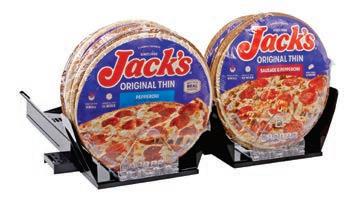
The rack’s locking, adjustable-width sidewalls ensure that every box stays in its place, keeping planograms perfect and shelves pristine. With its pusher paddle and anti-tip technology, every pizza package stays upright while maintaining product integrity.
Make your pizzas the star of your freezer and bring them into the spotlight with NEXT PRO PizzaRack!







By Bridget Goldschmidt
here’s a brand-new retail concept in Jacksonville, Fla., and it’s showcasing pickles and other fermented foods.
The Pickle Factory, which debuted Oct. 19 in the city’s Lakewood neighborhood, is the brainchild of Jacksonville-based brand Olive My Pickle, a company focused on small-batch fermentation.



From there, a brick-and-mortar store was the next step.


“Olive My Pickle was founded as a farmers market business in 2010,” CEO Charlotte Tzabari, the company’s co-owner with her husband, Shai, tells Progressive Grocer. “In 2018, we set our sights on expanding into the online space, a process that took about two years to fully establish by 2020.”
That’s not all that the store offers, though.

“For 14 years, Olive My Pickle has had the joy of hearing customers, both online and within the Jacksonville community, share their love for our pickles and fermented foods,” says Szabari. “When the opportunity arose to open a storefront at the property we’ve called home, we knew we wanted it to be more than just a retail space. We envisioned a pickle concept store — a destination that celebrates all things pickles, featuring our 40-plus products, as well as pickle-themed gifts, home decor, accessories and apparel.”
“What sets The Pickle Factory apart is its immersive shopping experience that brings together food, education, community and creativity,” explains Tzabari, adding that “guests can sample products and learn about their ingredients, flavors and stories from our team. Through interactive workshops like Pickle Making 101, How to Build the Perfect Charcuterie Board and Gut Healthy Cooking, the community can gain new skills and knowledge while deepening their connection to healthy eating. More than just a store, The Pickle Factory is a vibrant hub where guests are invited to shop, engage, learn and celebrate everything pickles in a fun, welcoming atmosphere.”
Asked about recruiting staffers for the store, she notes: “We have an incredible team at Olive My Pickle, and many of them have raised their hand and are interested in being our foundational store staff at The Pickle Factory. Our current team are not only experts in Olive My Pickle products, they are also the best people to represent our brand and values to the customer community.”
Now that The Pickle Factory is open, are there any plans to expand its offerings beyond its current assortment? “Our best ideas have always come from customers, and we’re counting on our community to let us know how we can continue to innovate new products and bring new and fresh pickle products to the market,” answers Tzabari.









“We envisioned a pickle concept store — a destination that celebrates all things pickles, featuring our 40-plus products, as well as pickle-themed gifts, home decor, accessories and apparel.”
—Charlotte Tzabari, Olive My Pickle
Meanwhile, those outside the Jacksonville area who want to experience an in-store pickle paradise have reason to be hopeful. “The love of pickles, and a store that celebrates that, is an idea that would succeed anywhere,” asserts Tzabari. “We built our headquarter stores with the franchise business model in mind.

Bridget Goldschmidt Managing Editor bgoldschmidt@ensembleiq.com


















